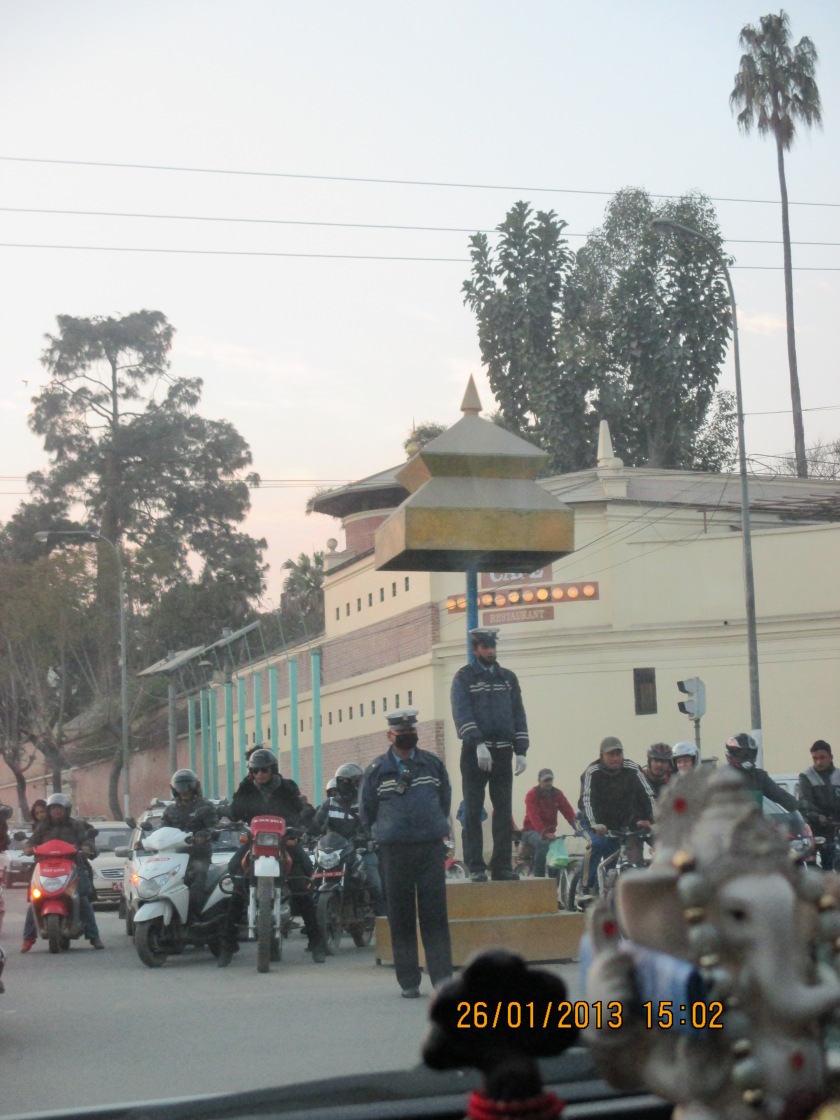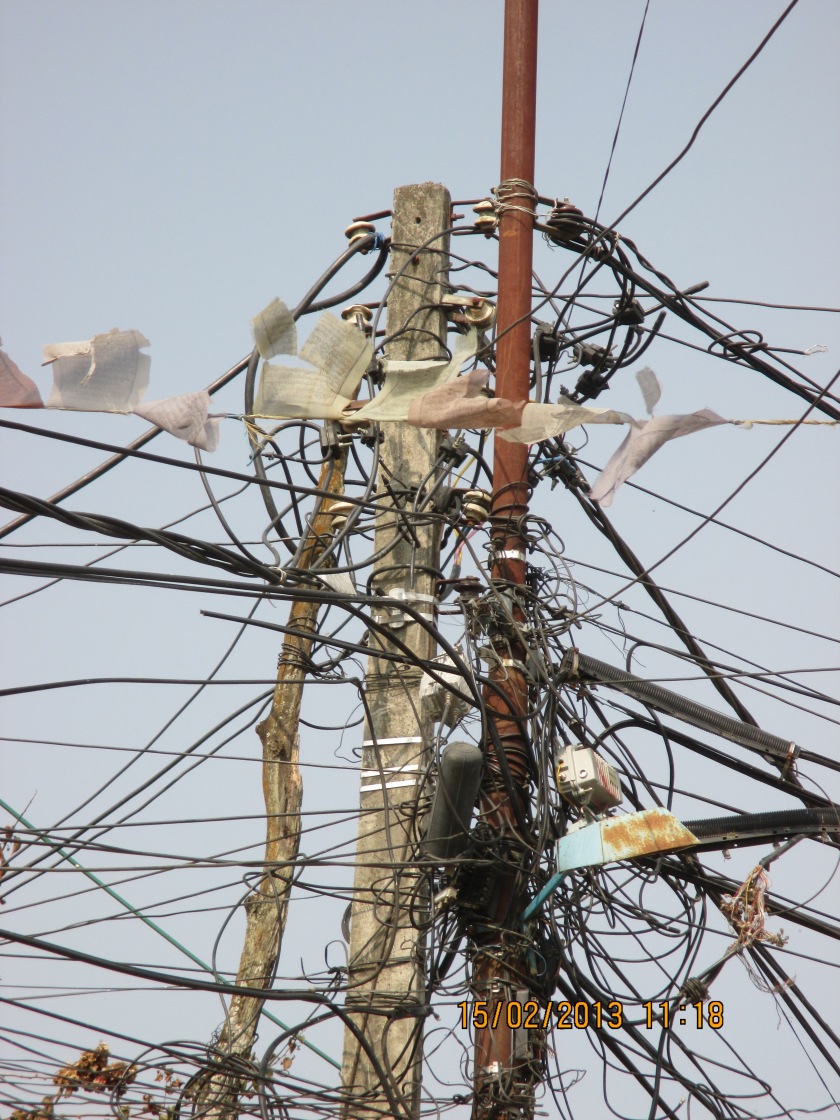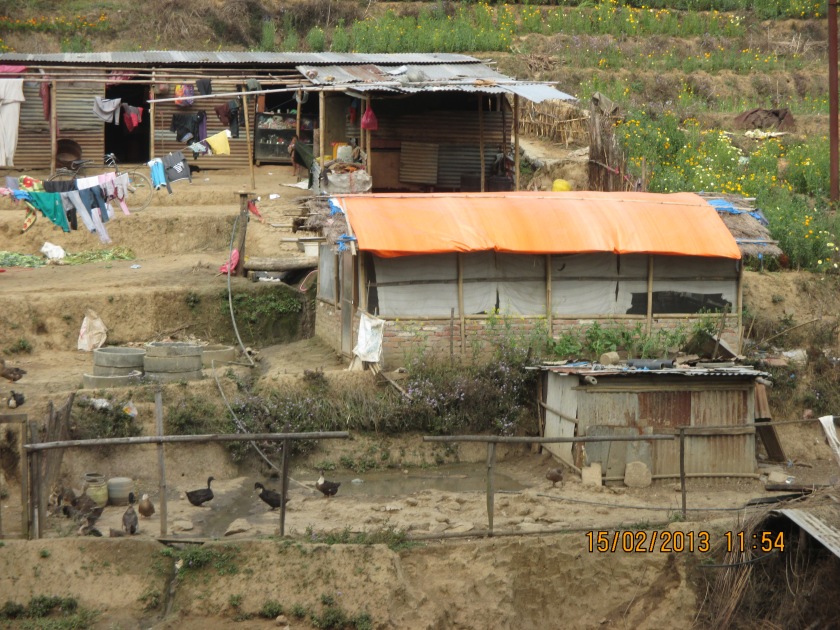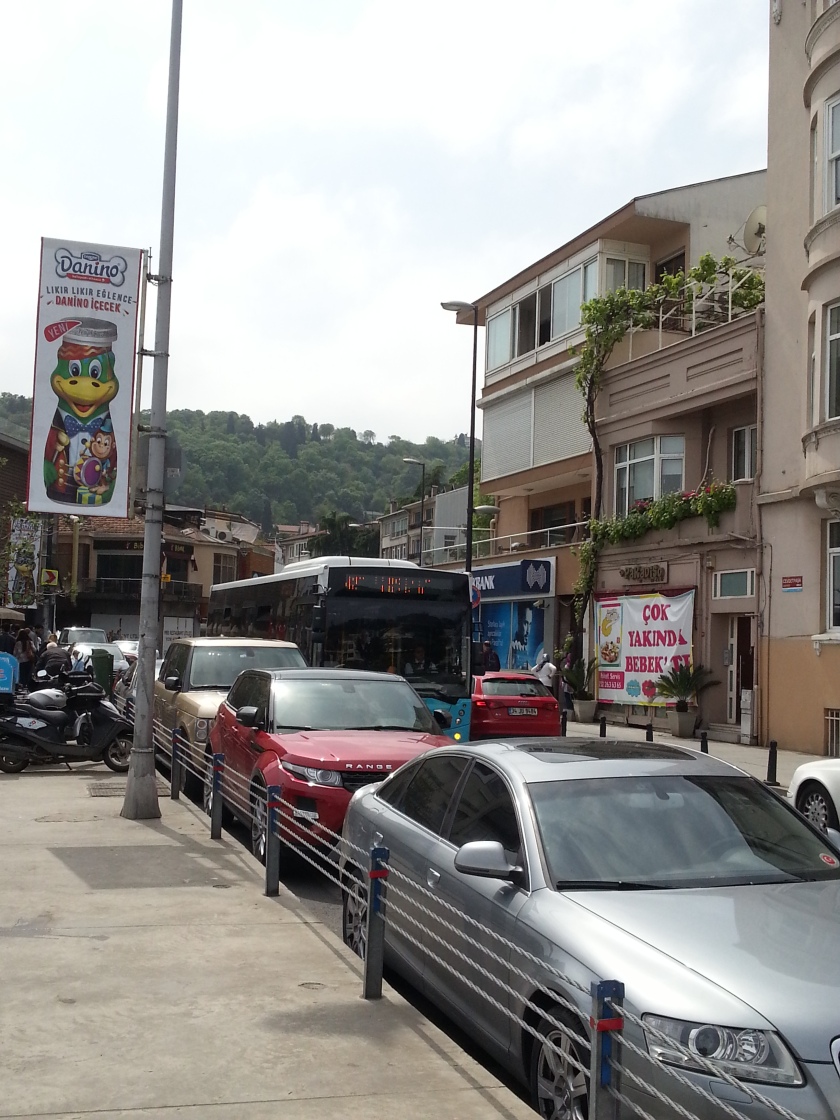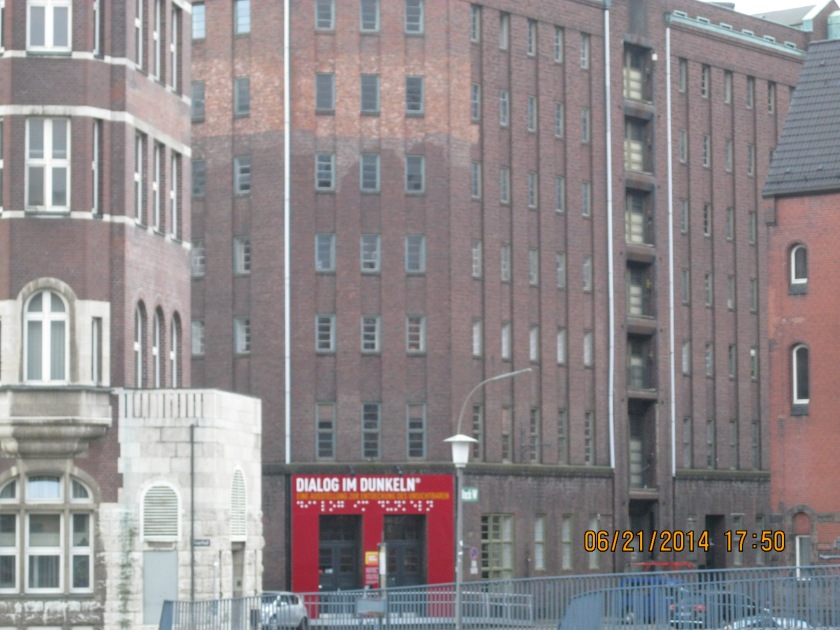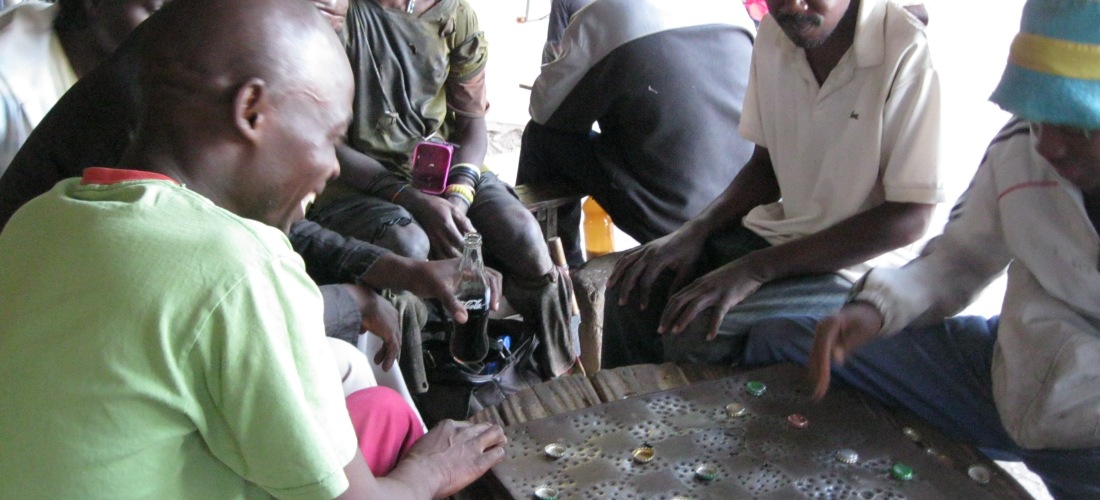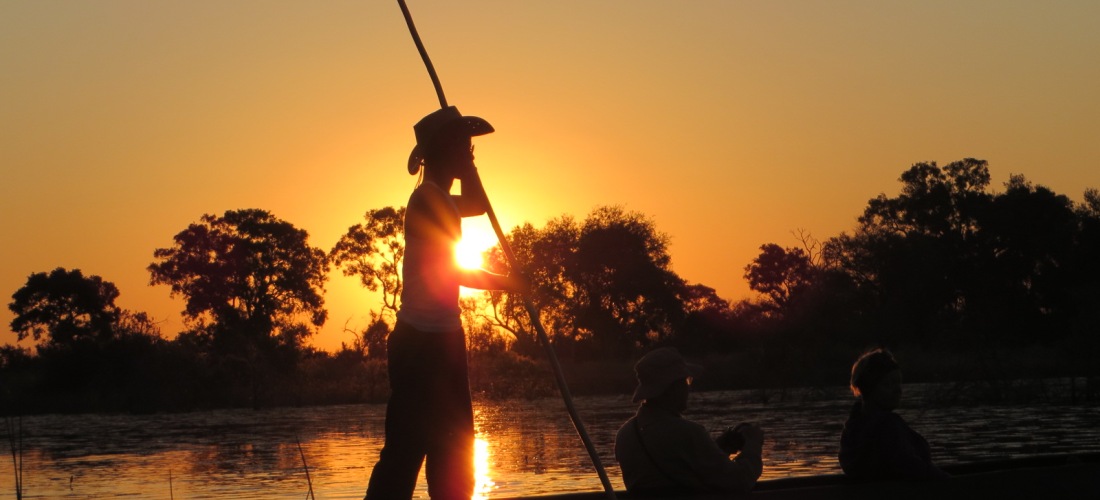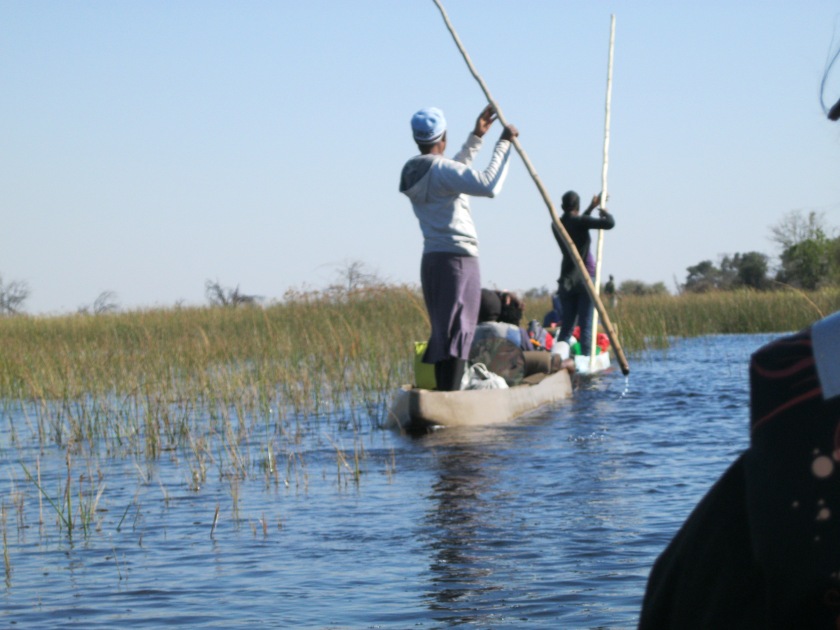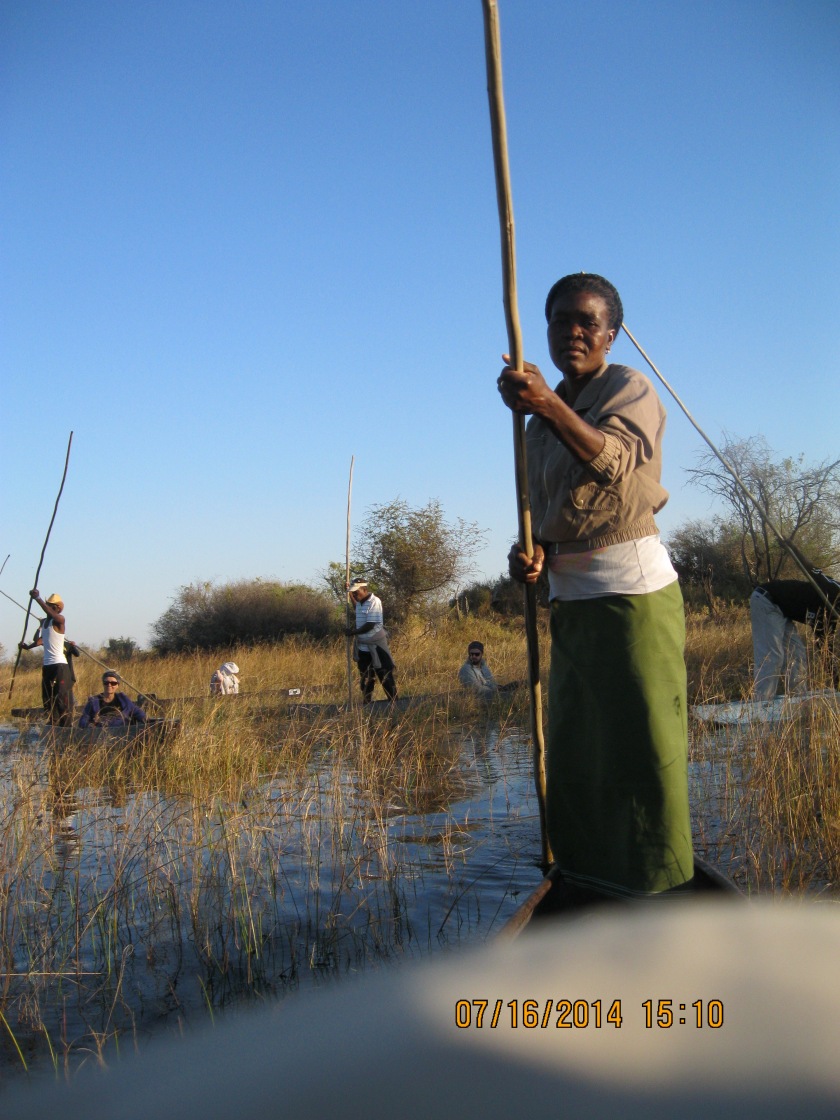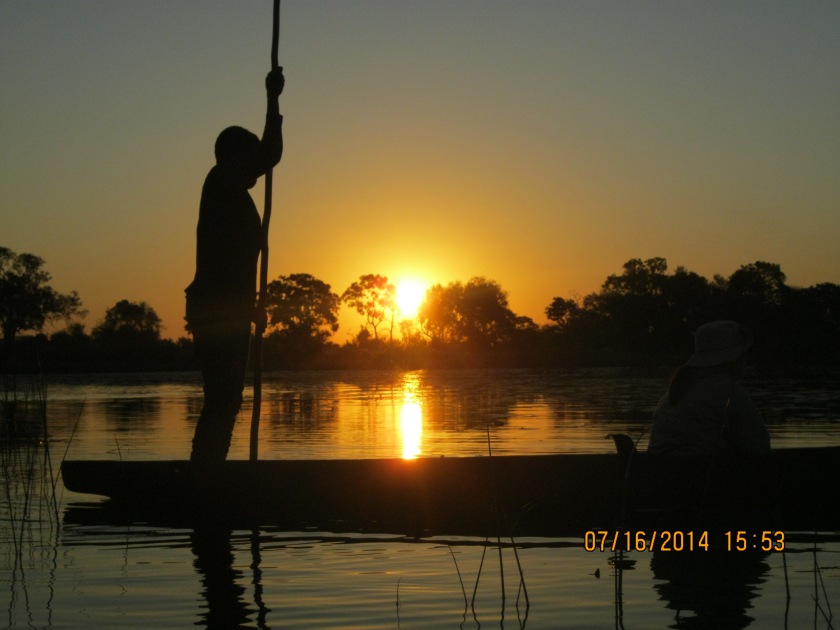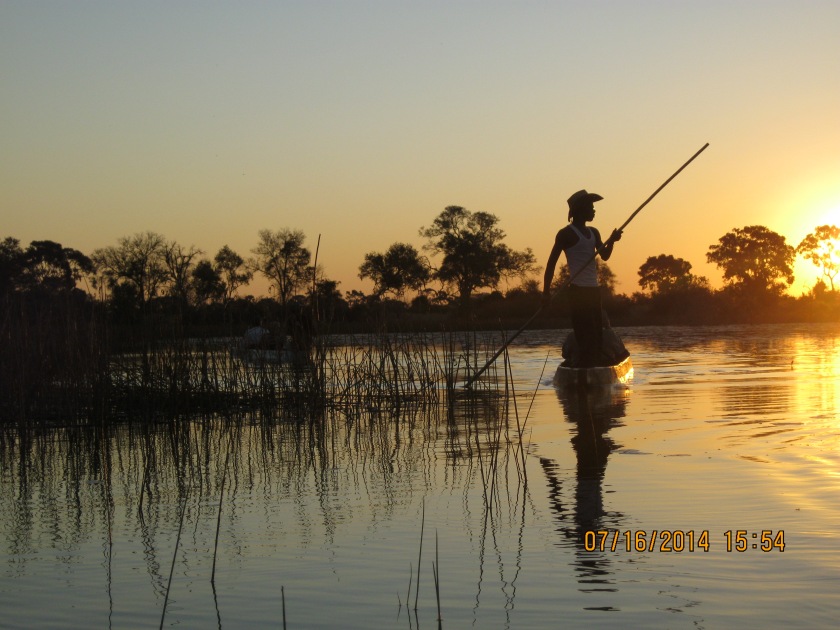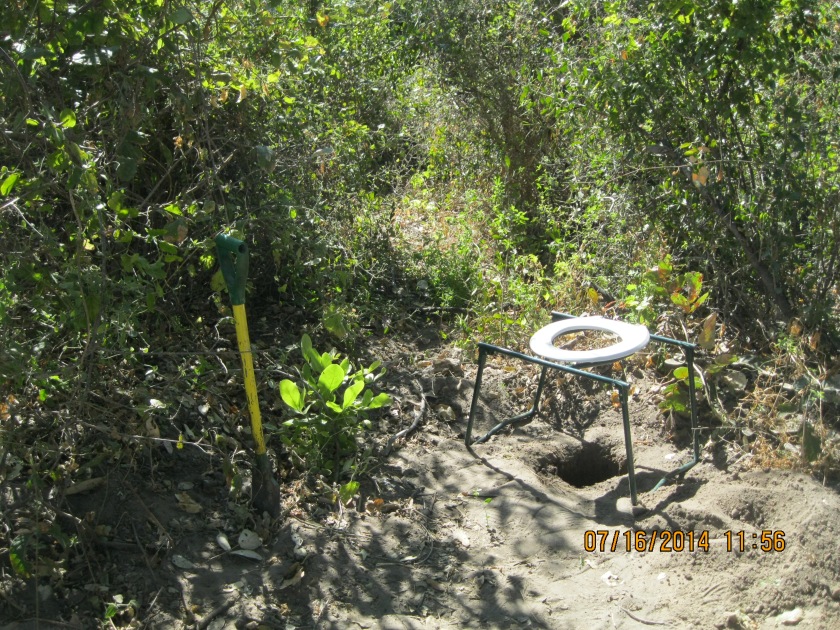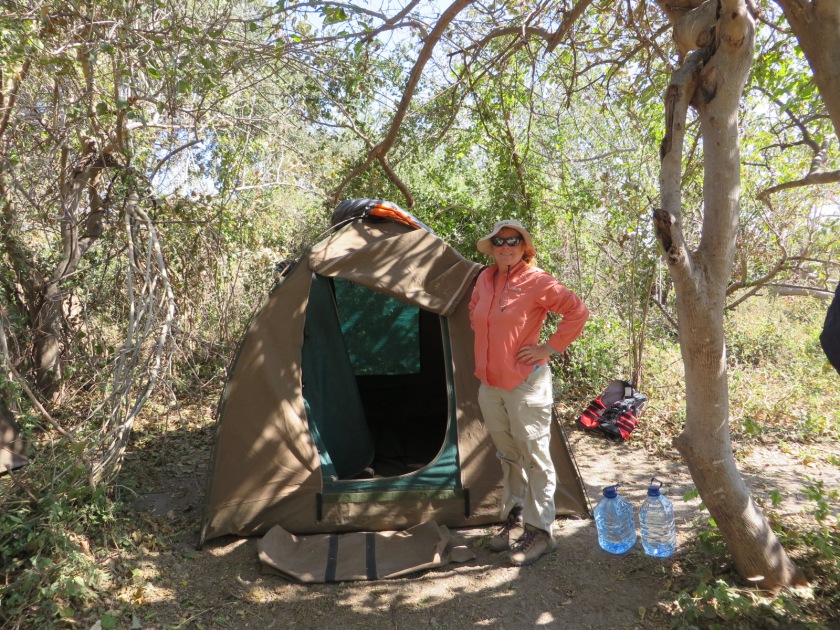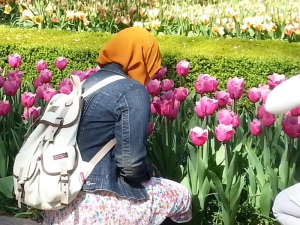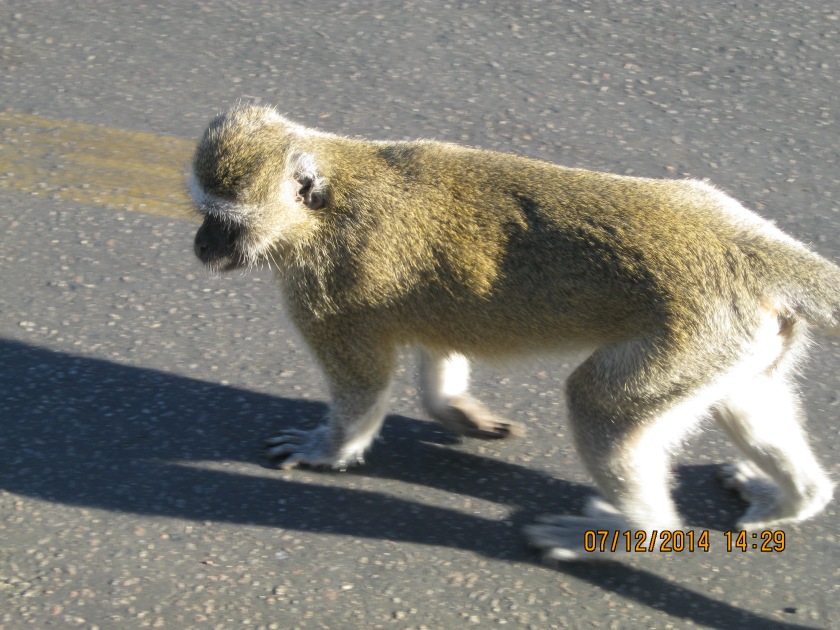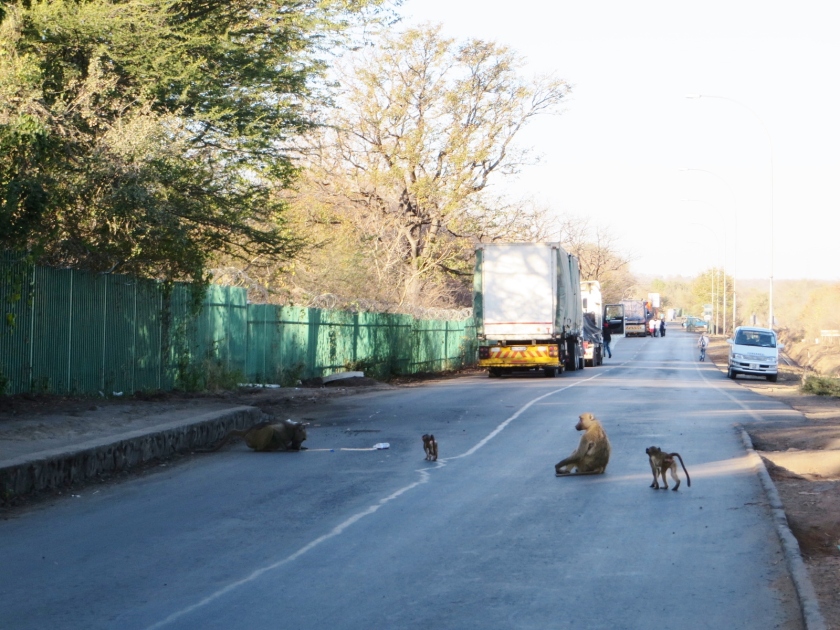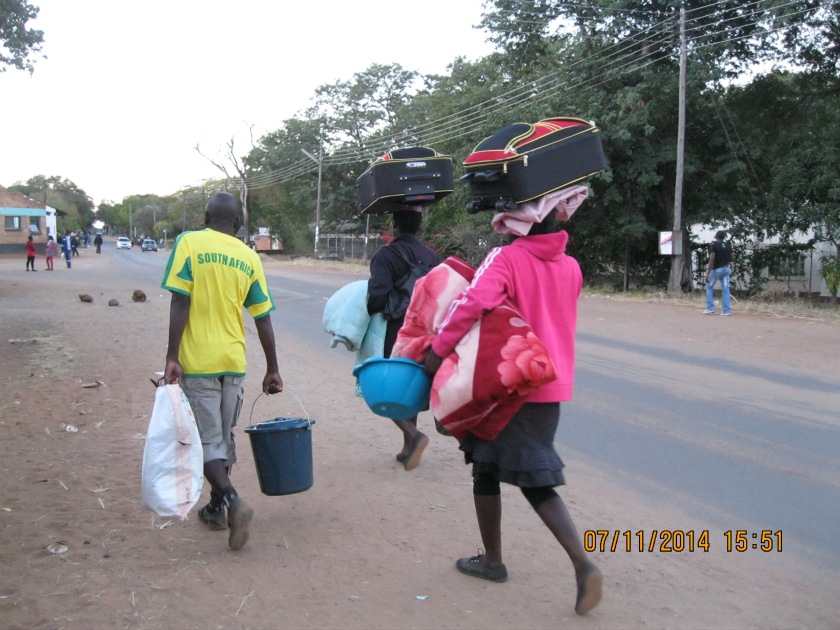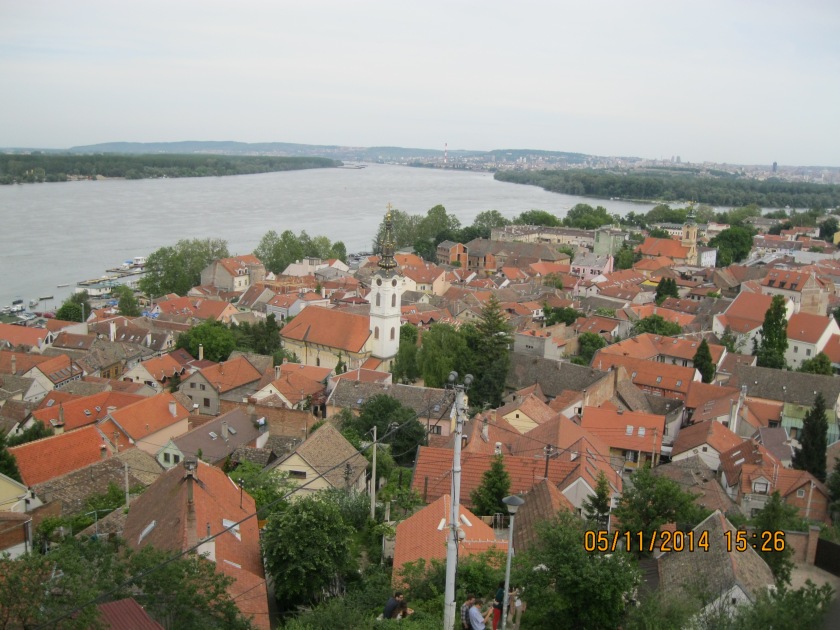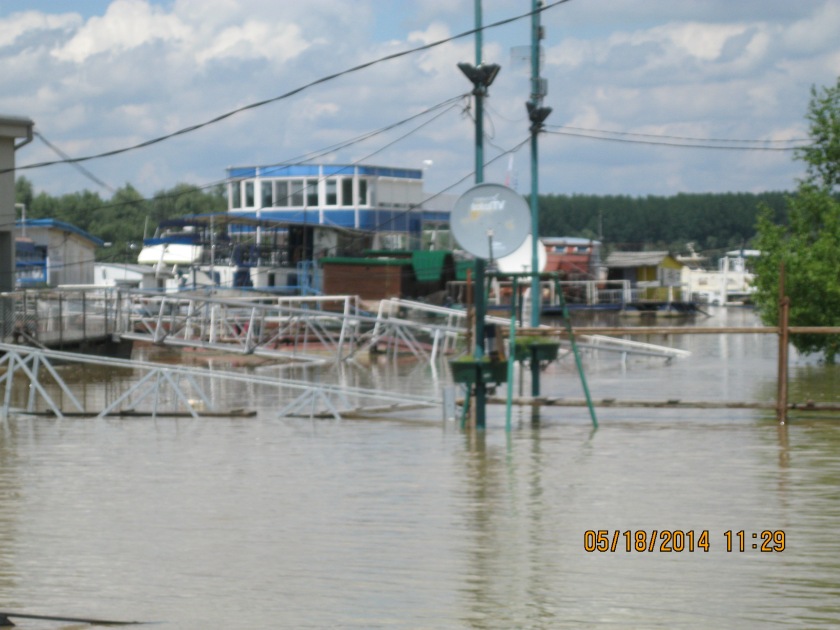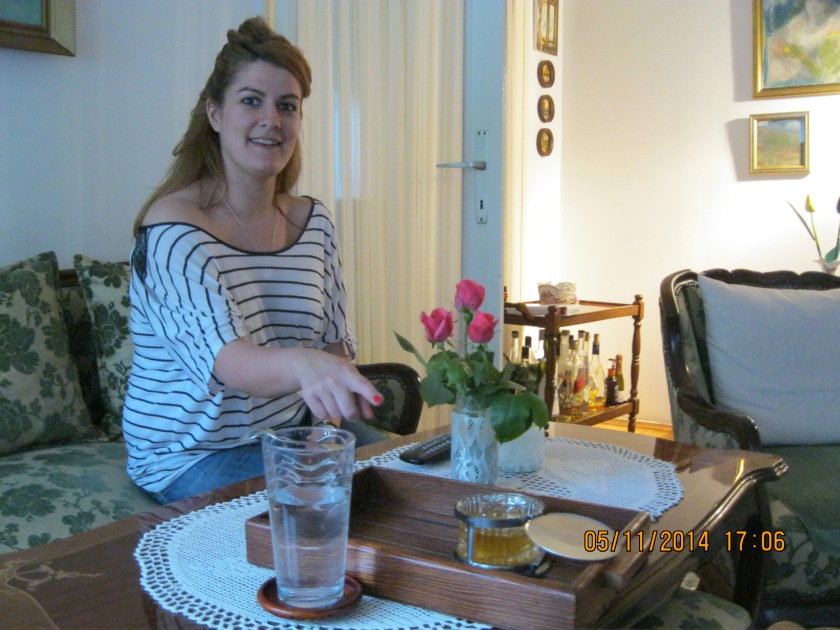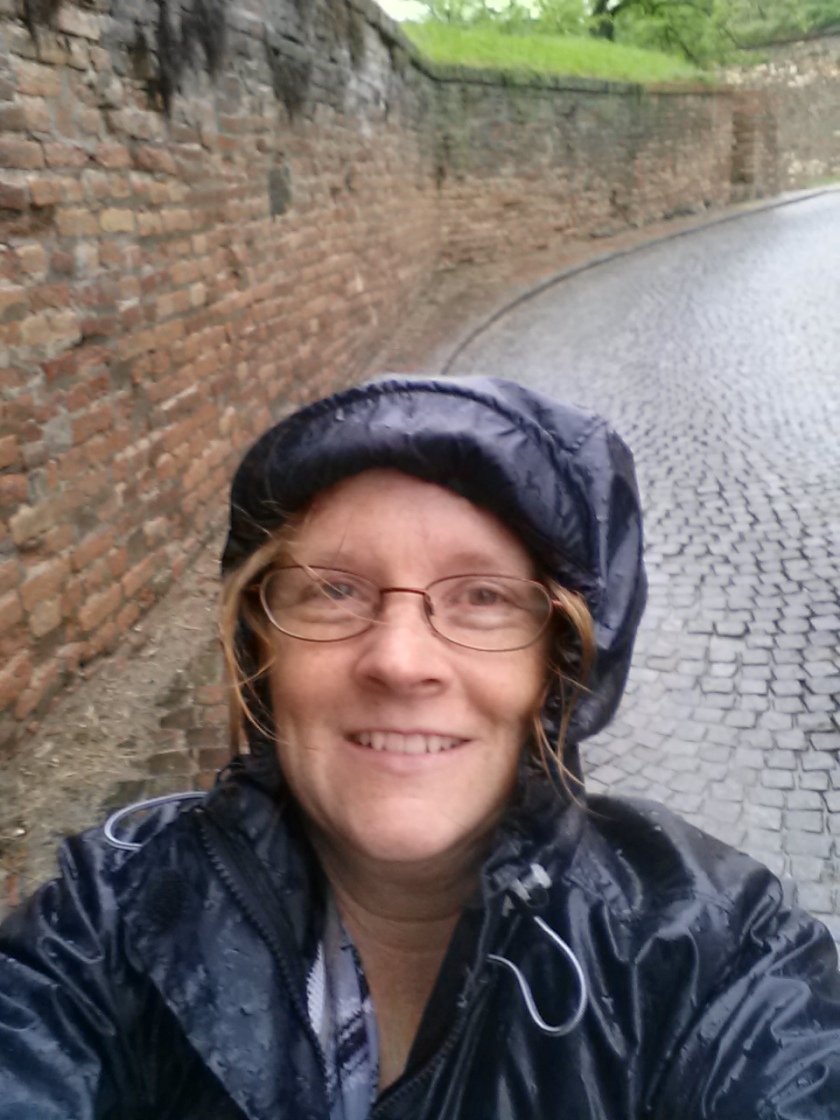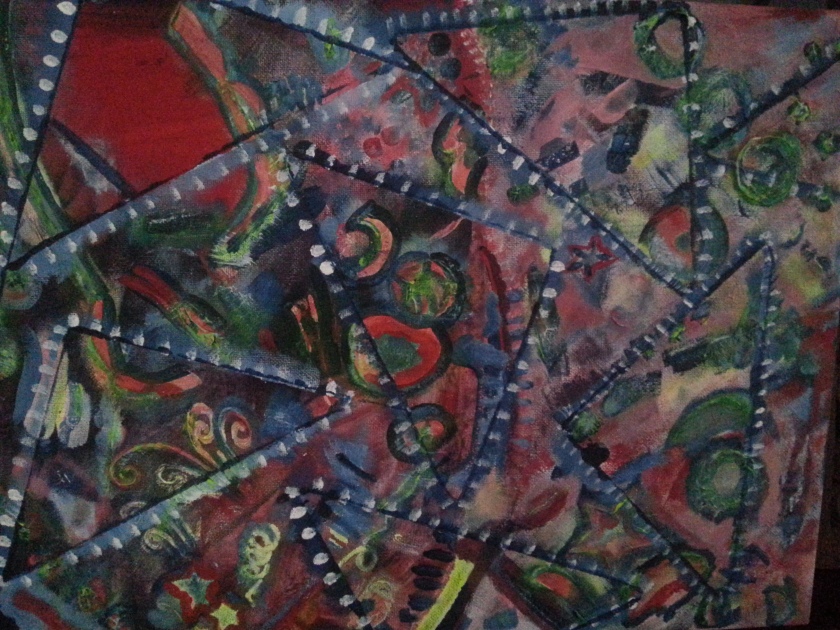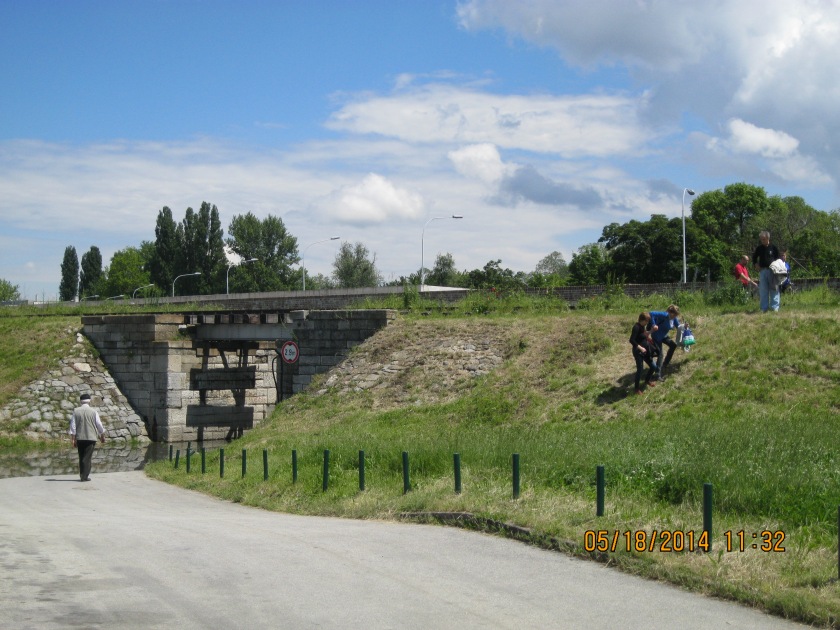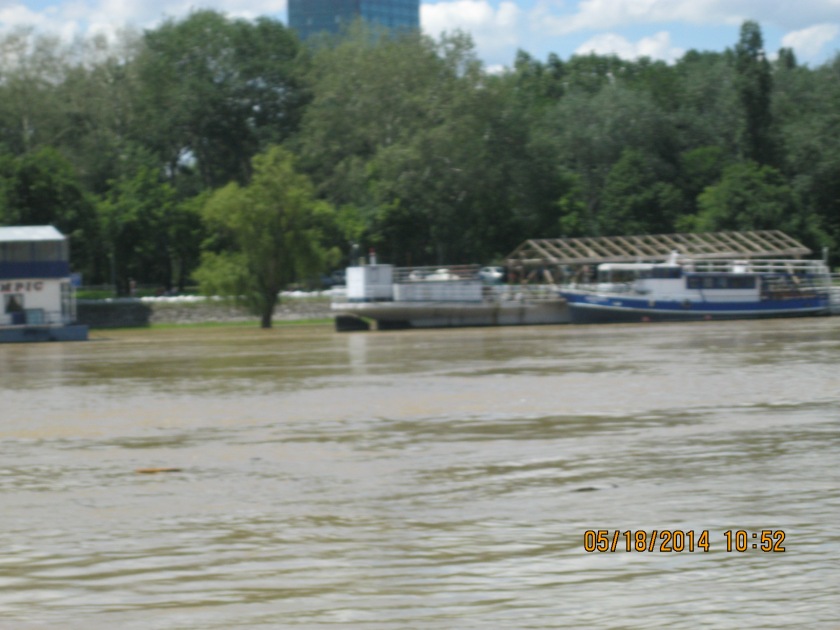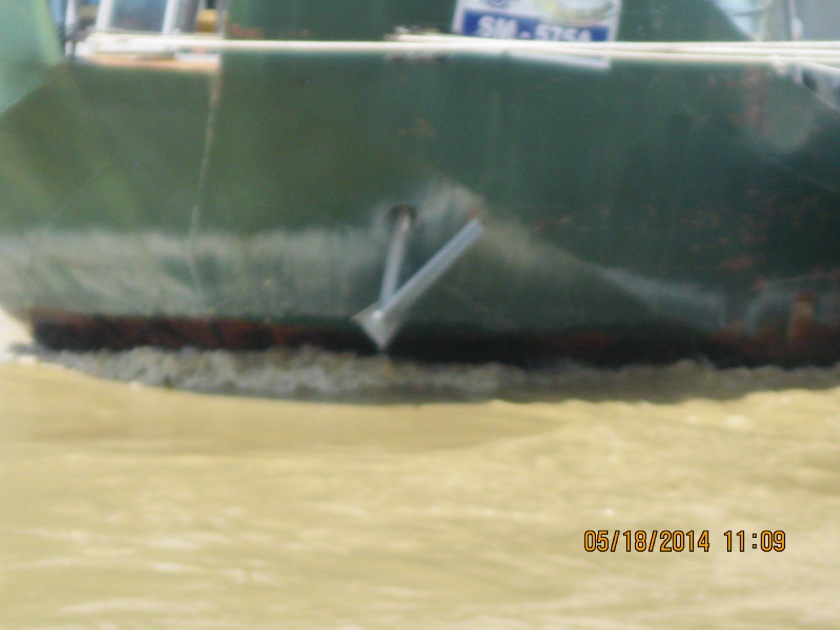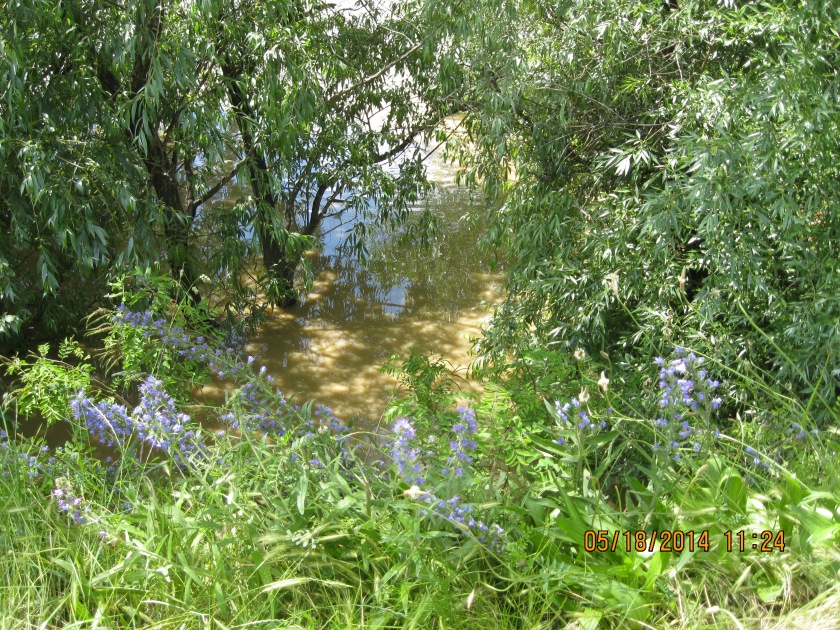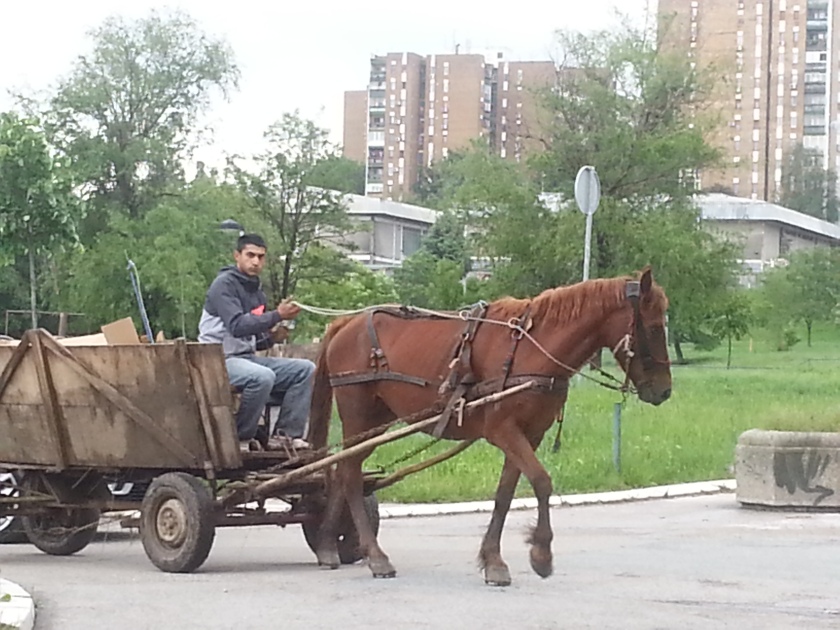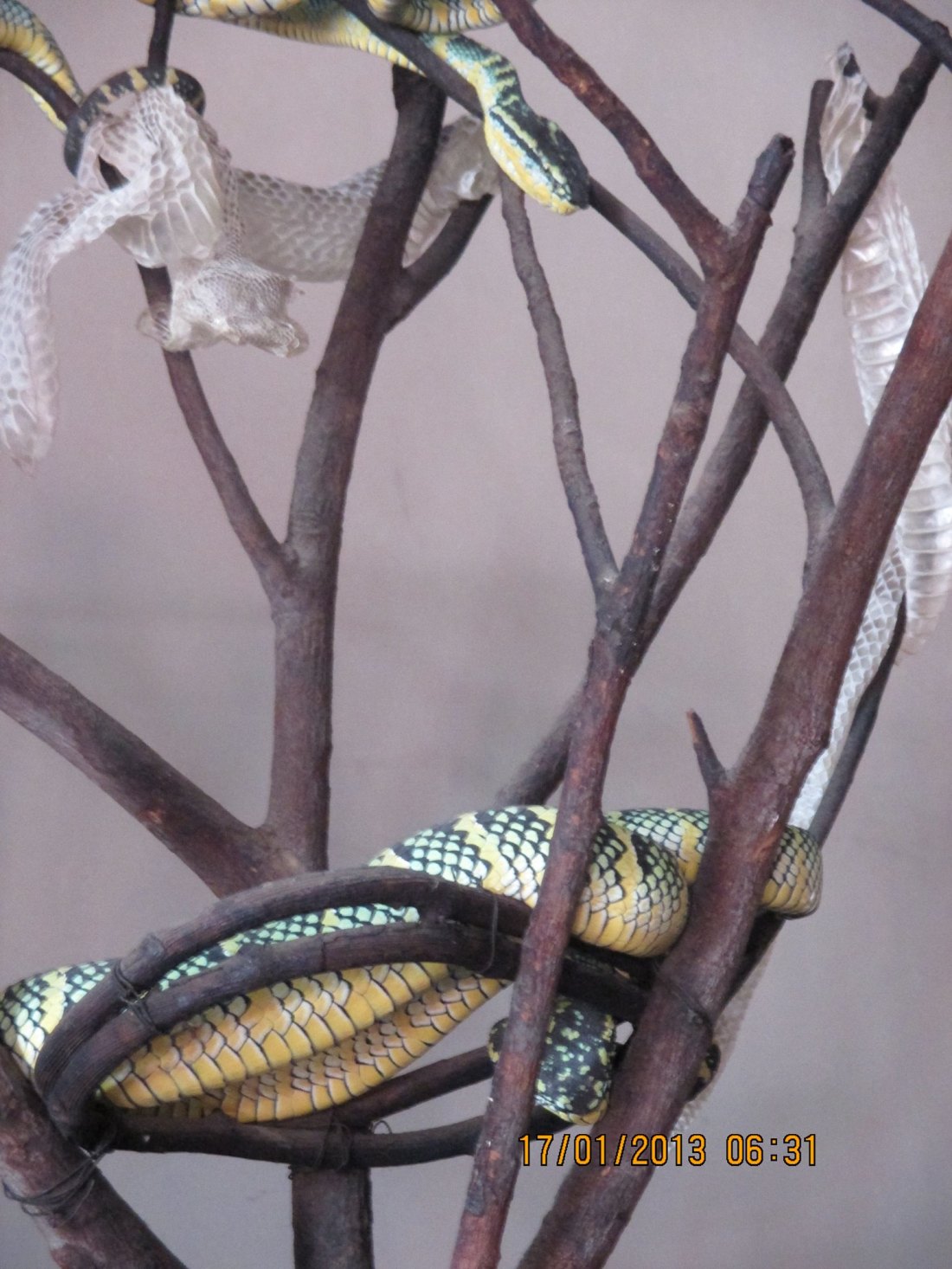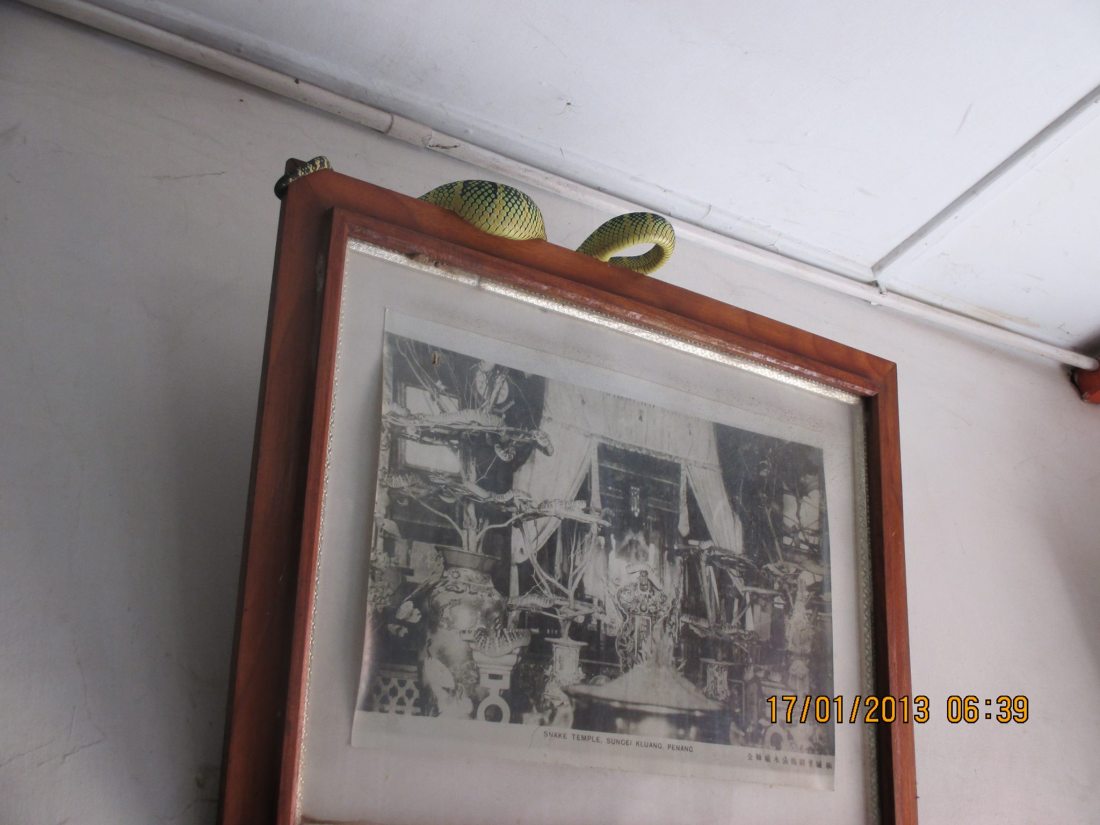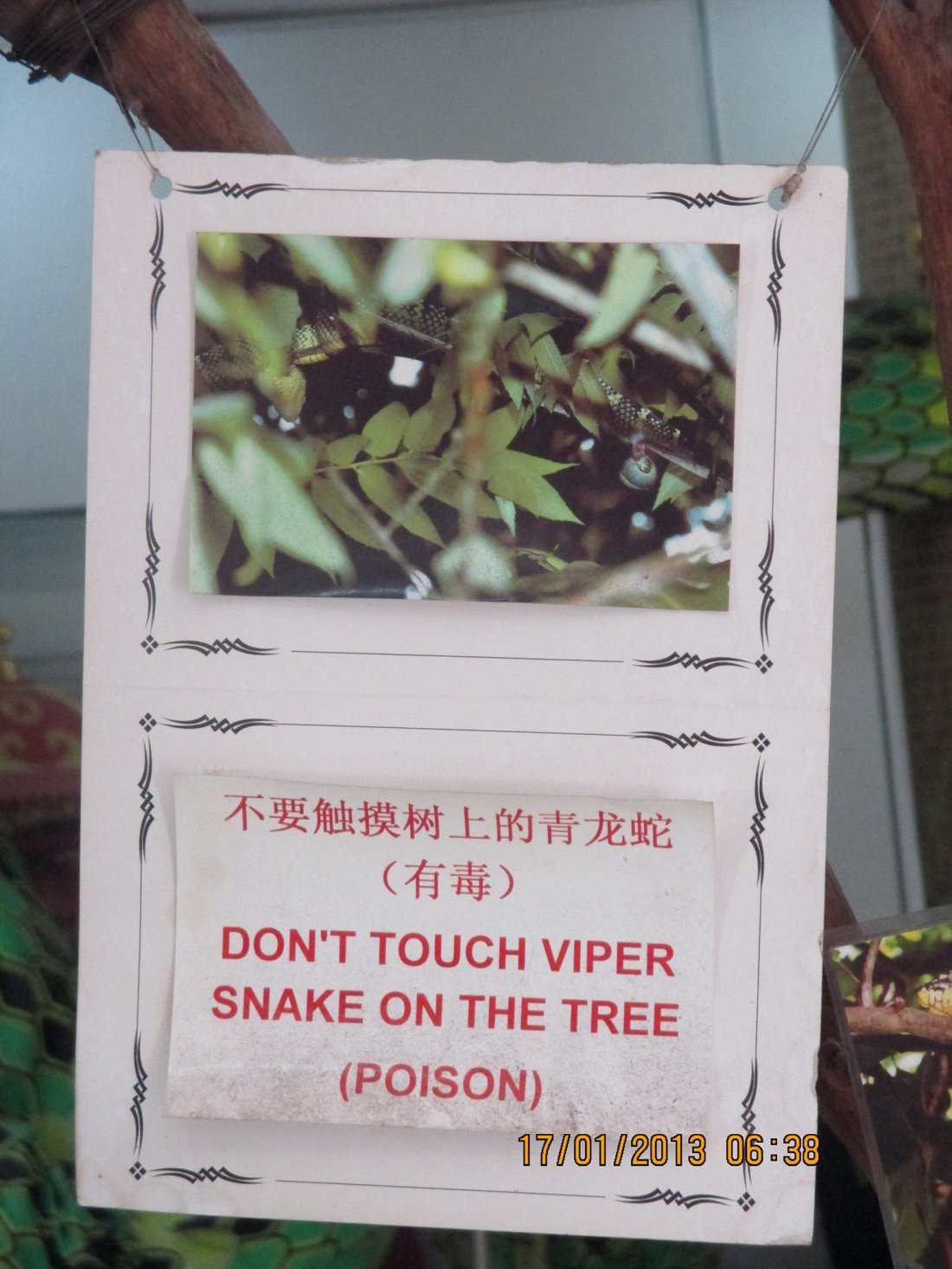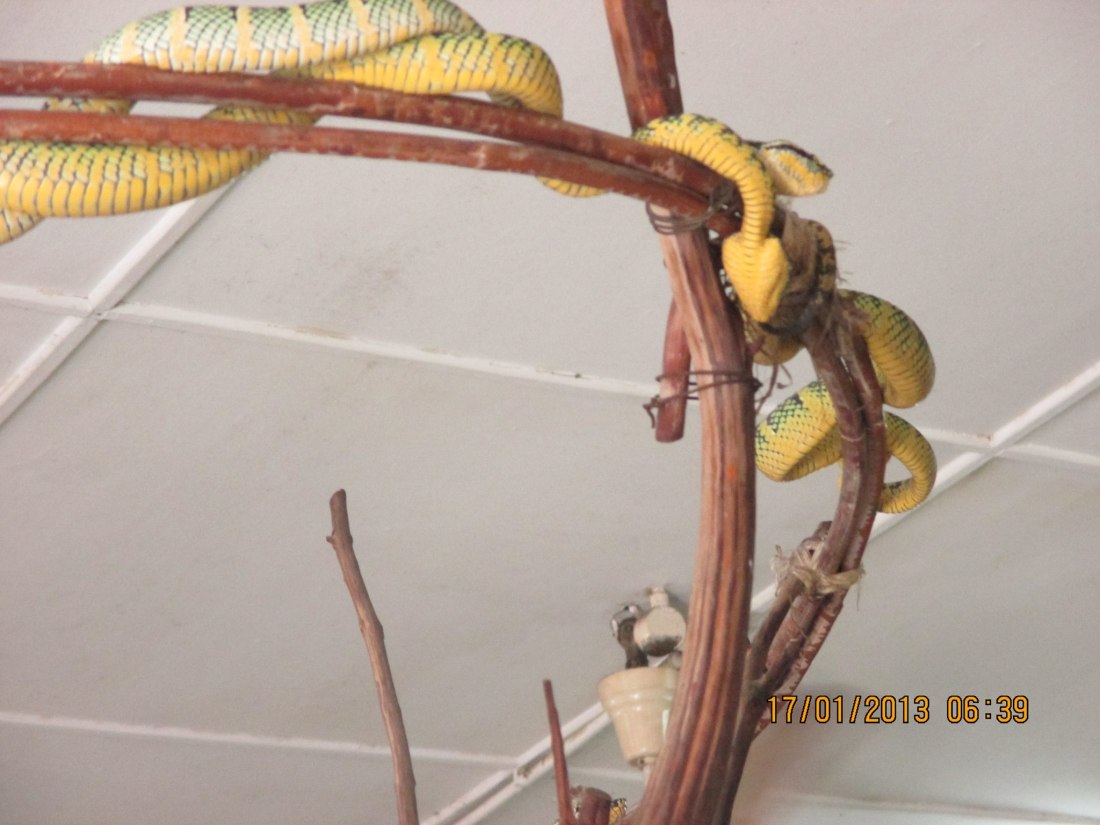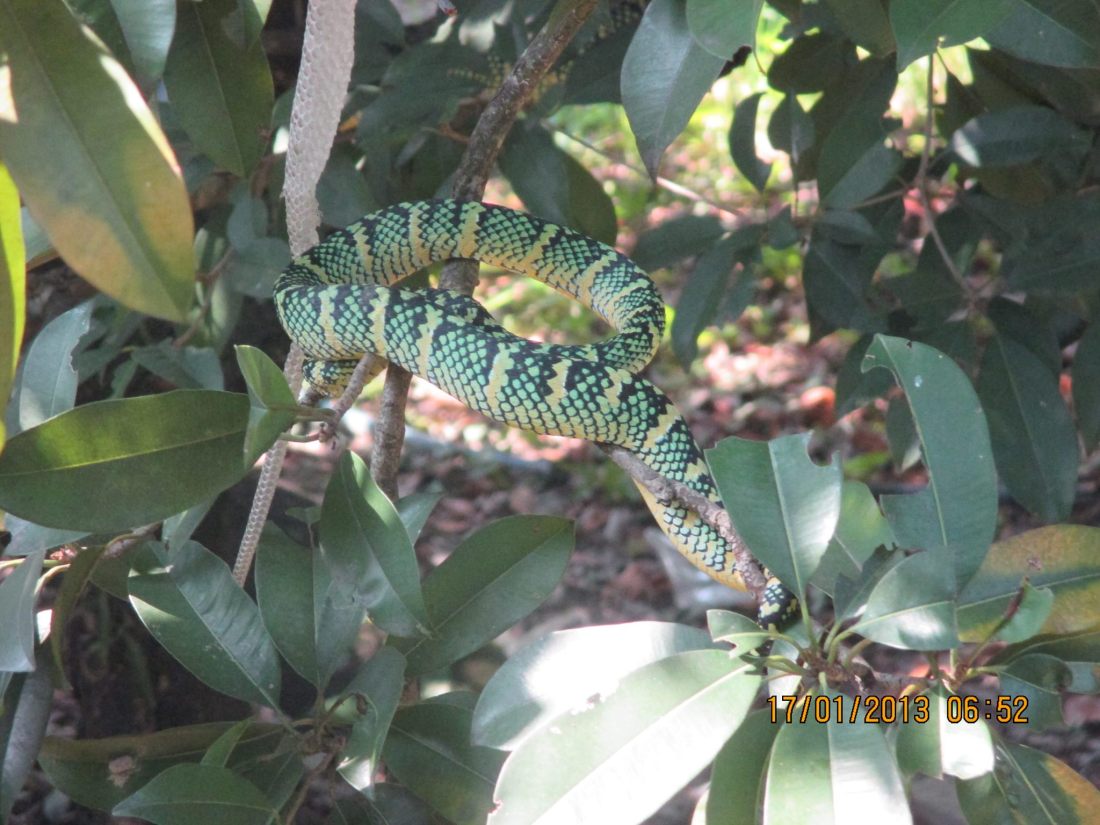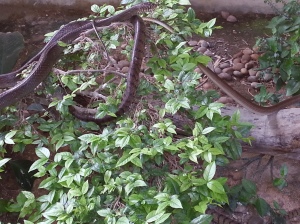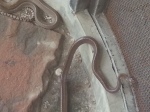Patiently I waited for a friend to arrive, an American middle aged mom like me who was to arrive sometime in the next few afternoon hours. I was uncertain what time she would actually arrive because this was Zimbabwe (Africa), and anything could happen. A bus from the airport to the Victoria Falls tourist district of thirteen miles might normally take 25 minutes with no traffic; traffic meaning an elephant on the roadway or other rambling wildlife like giraffes, lions or other carnivores .

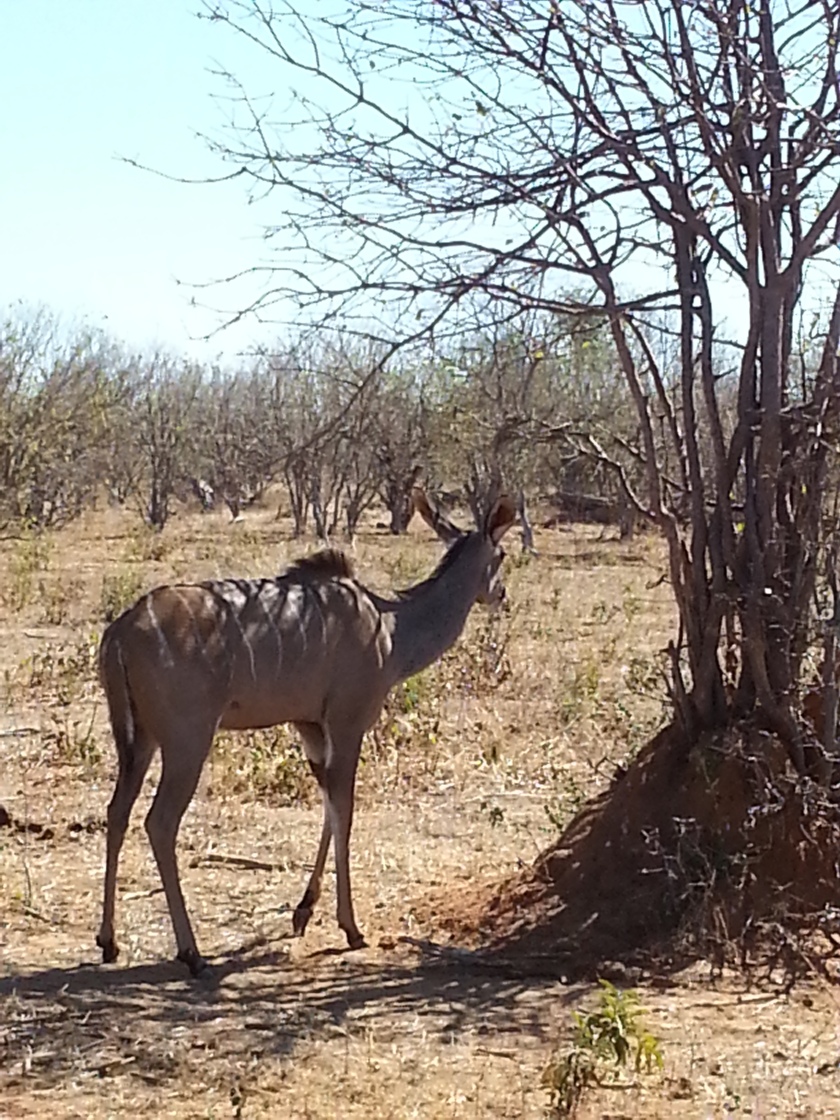
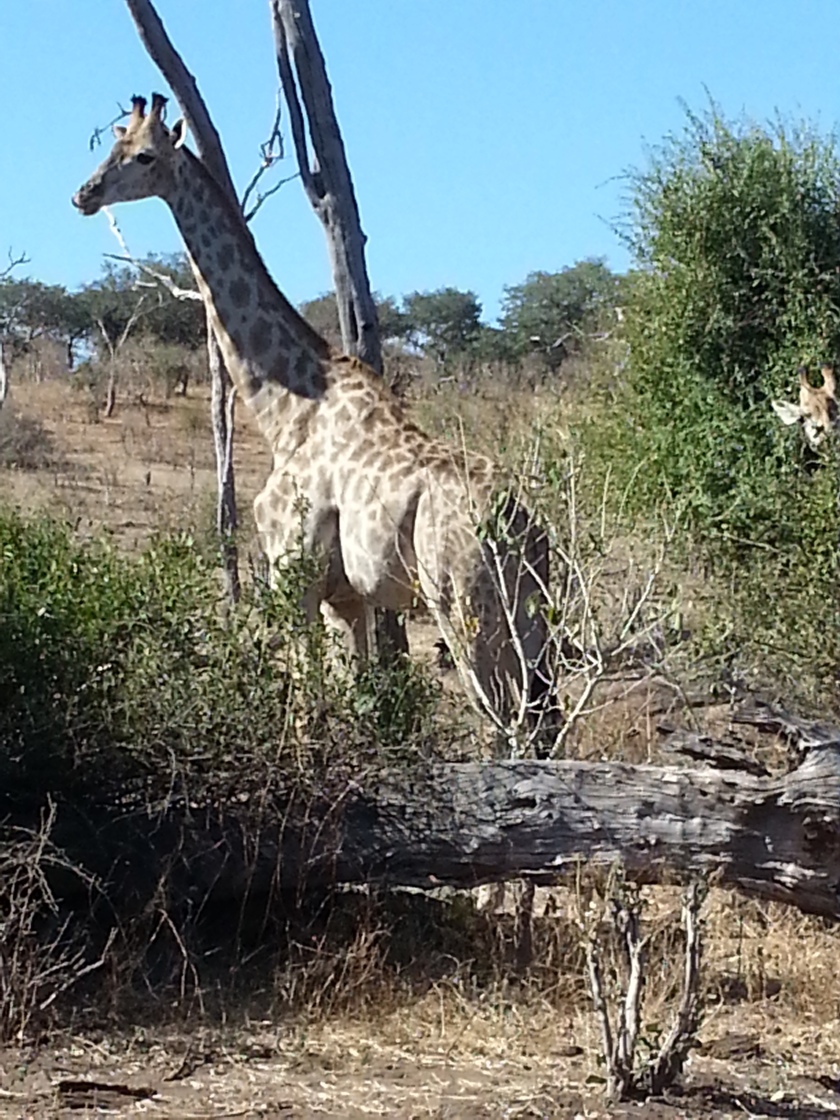
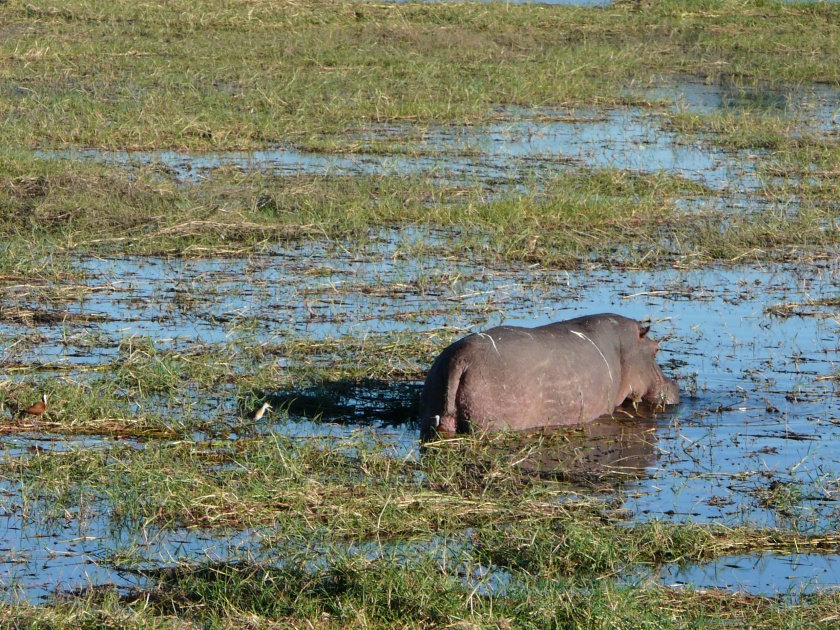
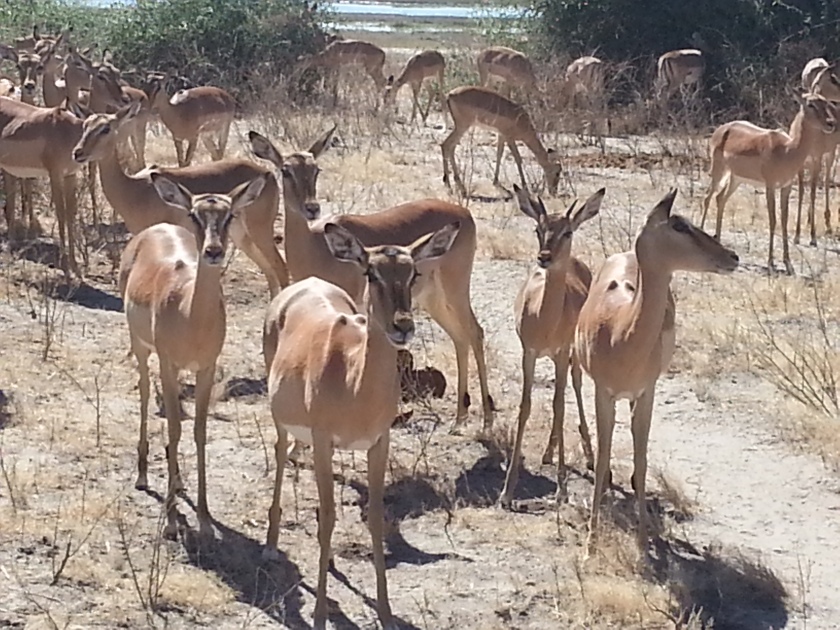
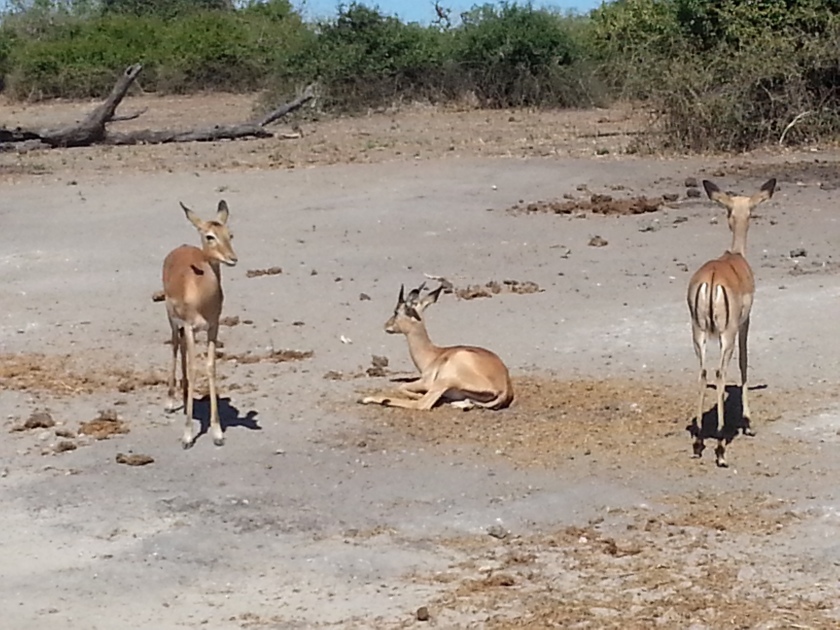
And if an elephant were to lay down in the middle of the road and give itself a dust bath, the passengers would enjoy the sight and wait. It is interesting to note that when in a jeep or on horseback, we are not recognized as human beings. We are recognized as a moving rock (jeep), or a strange looking horse with an extra tall hump.
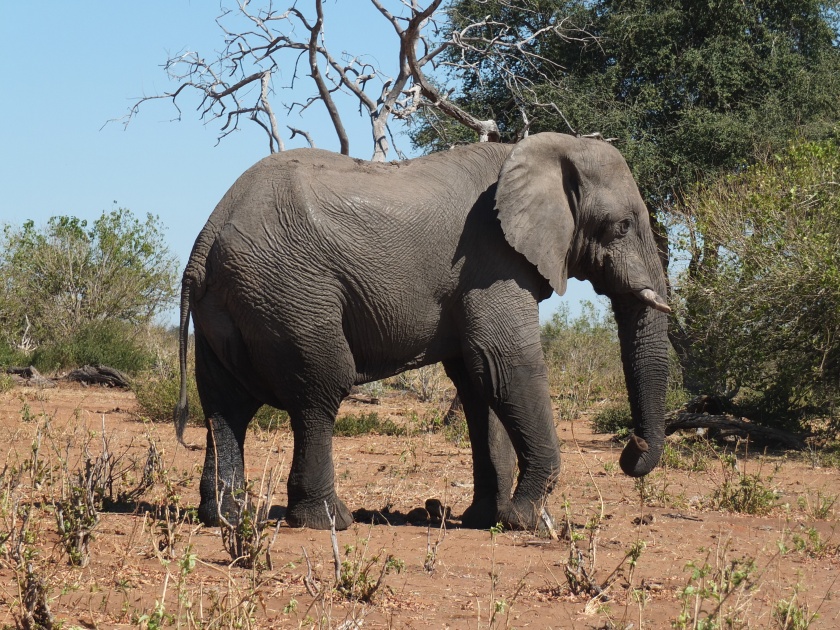
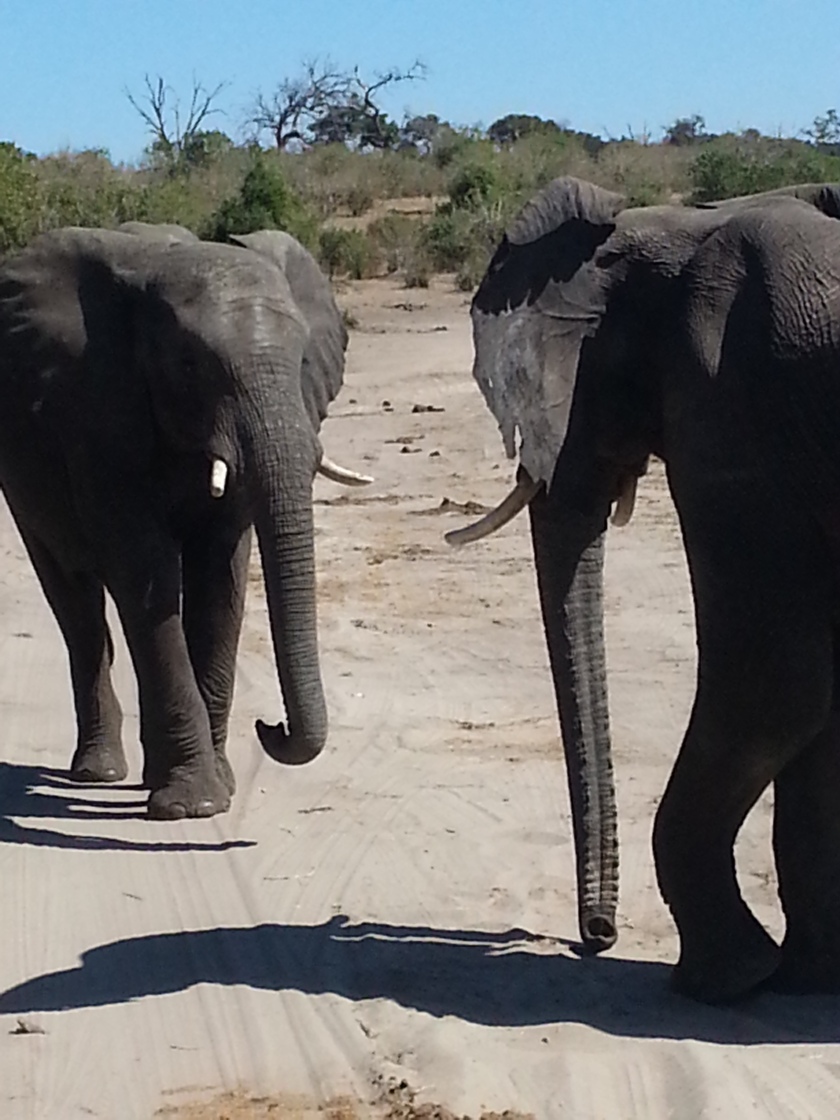

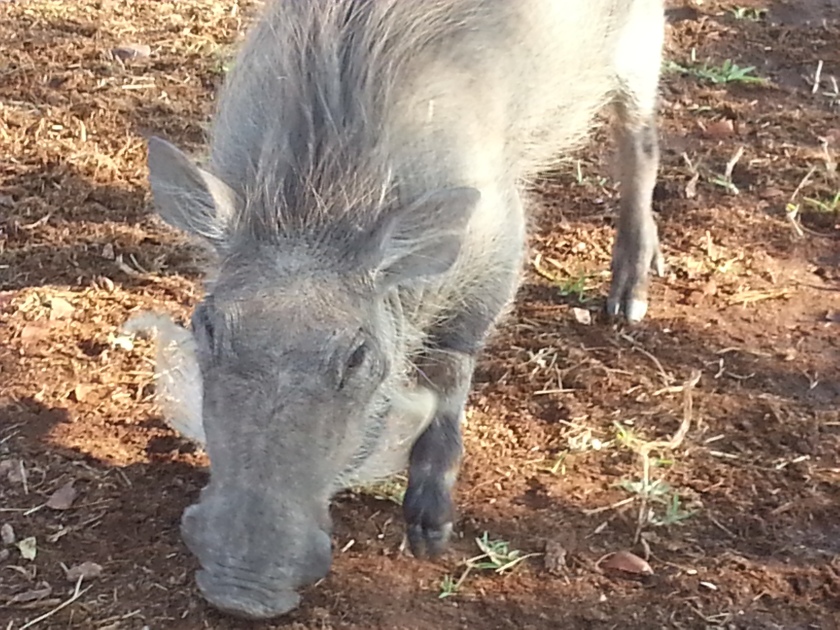
As I waited anxiously and excitedly – I still couldn’t believe that she was traveling alone halfway across the planet to join me in Africa. We had been Girl Scout leaders together when our children were young, so I knew she would be a good travel buddy. This was waaaaaaay out of her comfort zone (and mine too). I sat outside at a picnic table under a shady tree, eating lunch and talking to a local woman named Reumbi, who owned and worked inside the gift shop. Reumbi was a sweet girl and she and her husband had 2 children ages 11 and 2 years old.
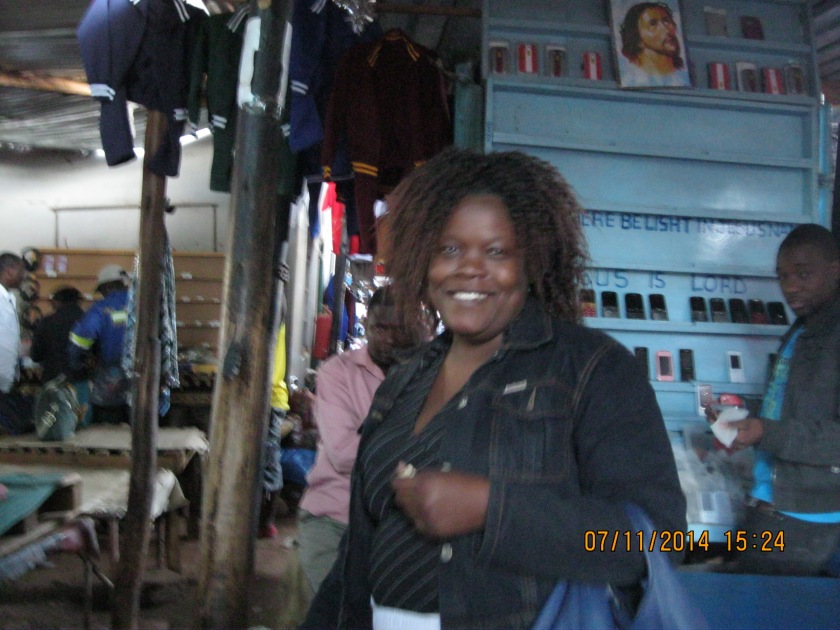
Reumbi, a sweet girl that took us on a tour of how she and her family lived.
She was currently separated from her husband because “he had too many girlfriends.” English is a second language and with life being so different, that could mean anything from the literal “he had too many girlfriends” or might mean he is dying from AIDS. 25% of the population in Zimbabwe is HIV positive. Instead of betrayals and a broken heart, she may have been thinking about staying alive to raise her son and daughter. She had recently moved back into her mother’s home, joining two sisters,their kids and her mother.
We talked about family planning and how women can buy 30 days worth of birth control pills for $1 in Zimbabwe. In the USA it costs $70 for a 30 day package of the same drug. Many of the people I spoke to discussed family planning. Children cost money to raise and educate, and each of the people I spoke to took this very seriously. They want their children to have a better life.
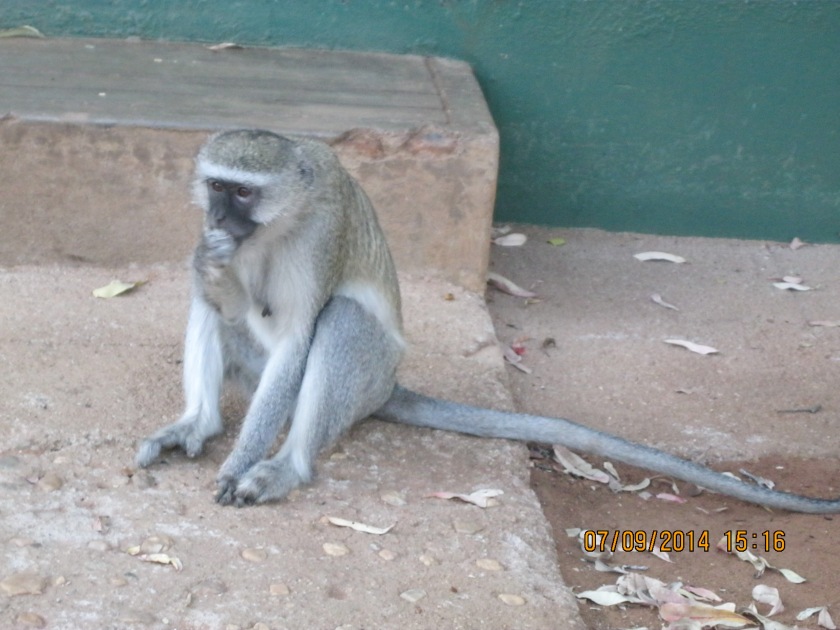
Monkey near a chalet in Zimbabwe
Reumbi warned me to watch out for the monkeys. If they spotted me eating, they may try to snatch my food. She advised me that the monkeys only attack women, not men. They know that the men fight back and that women scream and jump away. I hunched my shoulders and wrapped my arms around my plate in a protective stance to fend off any monkeys who wanted to snatch my food. I felt like a dog guarding its’ food, using my peripheral vision to stay on guard. I had walked to the local grocery store and purchased a few pieces of fried chicken and a biscuit and was enjoying the few things that were familiar to me. We discussed a variety of topics while we sat at the picnic table, me waiting for my friend, Reumbi waiting for customers. Periodically, she would leave the picnic table and go into the boutique, a small office that served as her shop in a room attached to the lobby, to help a potential customer.
After asking about childcare, family life and miscellaneous other details of life in Zimbabwe, she asked if I would like to come to her house and “watch them eat.”
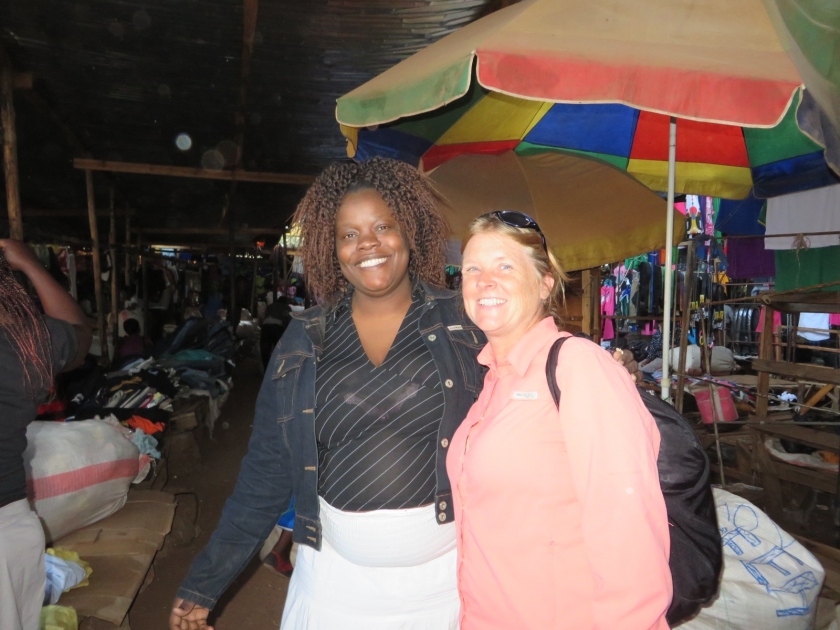
At the local market where Reumbi shopped. There was no electricity, so it had to be completed before dark.
I couldn’t believe it. I asked if I could also bring a lovely Australian couple I had recently befriended and voila – a small, personal, authentic group tour to better understand daily life.
To me, this is what made solo travel so worthwhile, the interaction with locals and learning by experience. In the USA there is information overload and it is difficult to know who to believe. This experience was one the highlights of my trip. It changed the way I think about the world. Before I left on this trip, I did not spend much time thinking about domestic politics in my country. I feel safe and my land has been peaceful all of my life. My country is in war, but it does not effect my daily life, because none of it happens in my land.
Now that I have seen the results of a variety of governments, I realize how important that I be involved. Bad leaders get elected because good people don’t vote. Life is hard enough with a good leader, the amount of massive destruction one bad person in power can do in a short period of time is nearly unfathomable. I still think about Reumbi and her daily life every day.
We met Reumbi at 5:00 p.m. after she closed the boutique. She invited her friend Lisa to join us. I think Lisa agreed to help keep track of us so we didn’t get lost or wander off. We walked with them to the intersection and turned left down the 2 lane paved road which was the main street of Victoria Falls. After walking a couple blocks, we stopped on an dirt area on the side of the road with about 20 other black workers who were headed home, waiting to catch a taxi. We were the only white people in sight. A taxi van pulled up and we climbed aboard.
In Zimbabwe, the white people are rich and the blacks are poor. It is a fact of life, everyone knows it and they openly talk about it. We were the only whites in the van, and we raised a lot of excitement when we 4 rich white people climbed into the van, resulting in a total of 11 paying passengers in a vehicle that is the size of a minivan. We sat on each other’s laps. 11 people was not an unusual number to ride in this vehicle, but being white was. I sat in the very back seat next to a thin fellow who had a jug of petrol(fuel) in a glass container between his feet, and he carried in his lap a large gourd of homemade local beer. It was Friday night and people were ready to celebrate the weekend.
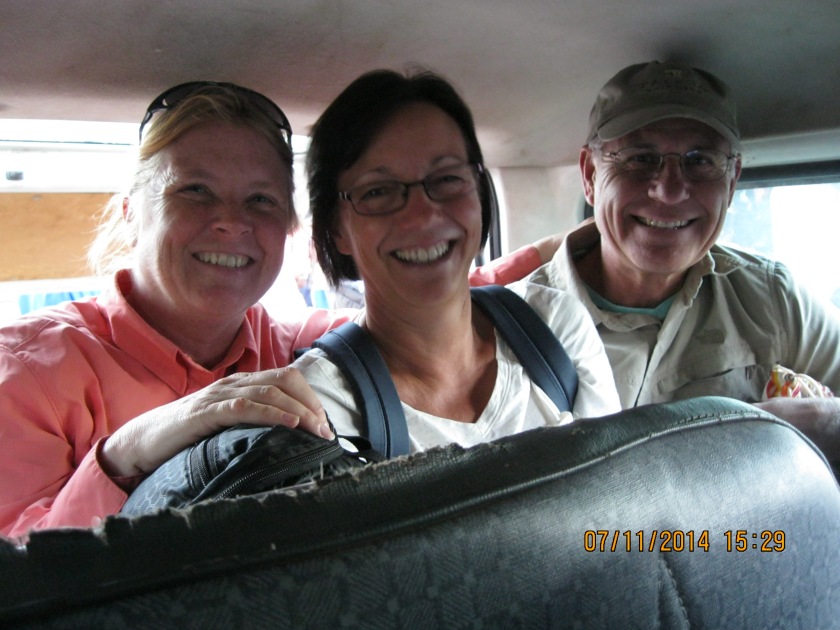
11 people in a minivan type taxi
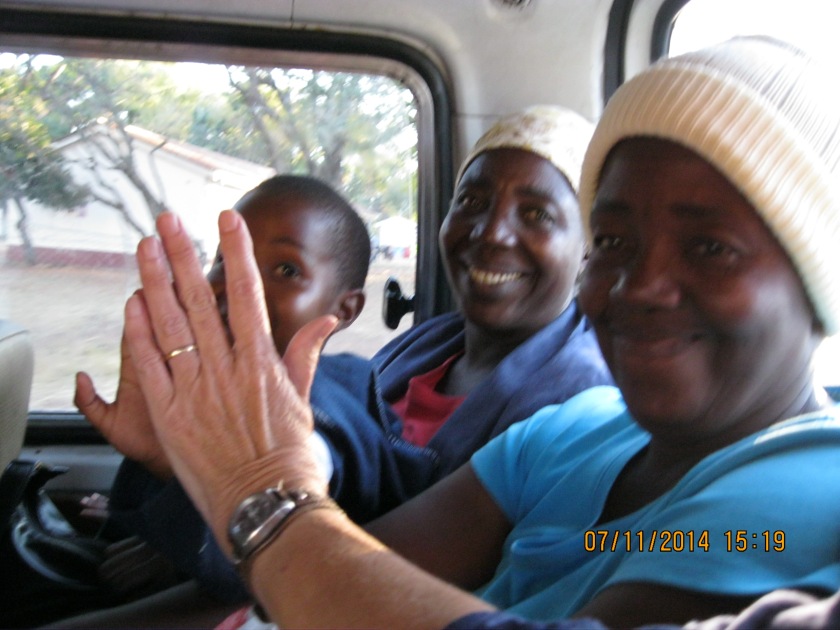
In a public taxi- there were 11 of us squeezed in and cost us 50 cents
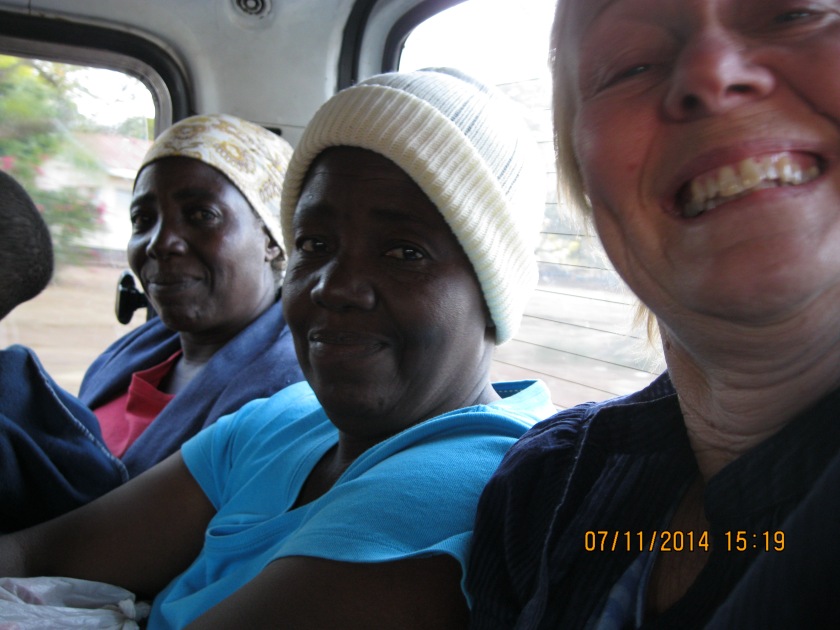
In a public taxi- there were 11 of us squeezed in and cost us 50 cents
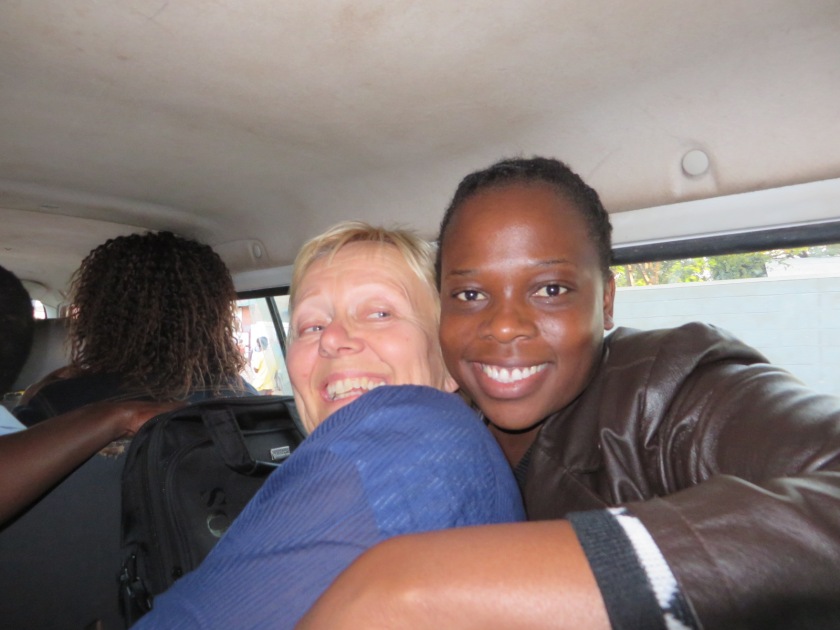
Reumbi asked if we would like to see some other things in her village and of course we said yes. Sometimes we walked and sometimes we rode in vehicles. We visited her church, her pastor’s home (we interrupted his dinner), the local hospital, and a small community for the elderly who had no family nearby. We continued, sometimes walking and sometimes in vehicles. One time the six of us rode in a four person taxi – seven of us with the driver, and the car would scrape bottom occasionally.
The township population is about 50,000 people. We exited the cab in an area that I will call a beer hall and paid the driver .50 per person. It was an pavilion type area with a roof and cement floor, but no walls, and it was very busy; mostly men but a handful of women. There were tables of checkerboards; someone had poked holes in a checkerboard pattern in a tin type of tray, and players used metal bottle caps face up for one team, and bottle caps facing down for the opponent. The game is called Draughts.
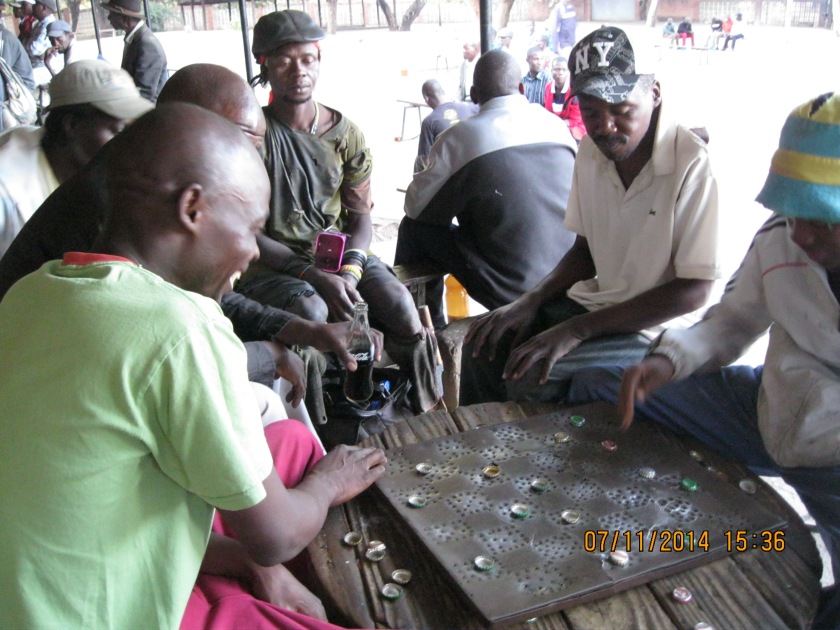
The local outdoor beer hall. These kinds were playing draughts and using bottle caps as the pieces. One side had them facing up, the other facing down.
Beer in gourds was passed around a group of about 20 people, each person taking some swallows and passing it to the person next to them. I suppose they weren’t worried about catching a cold, but that is the first thing I thought.What does that say about me? The luxuries I take for granted (owning glasses) or the fact that I don’t like beer? Perhaps both. Anyway, nobody minded sharing.

Drinking the local beer, everyone shares 1 container
We left the beer hall and walked to the nearby local market which had a tin roof but no electricity and lighting. People had to shop before dark.
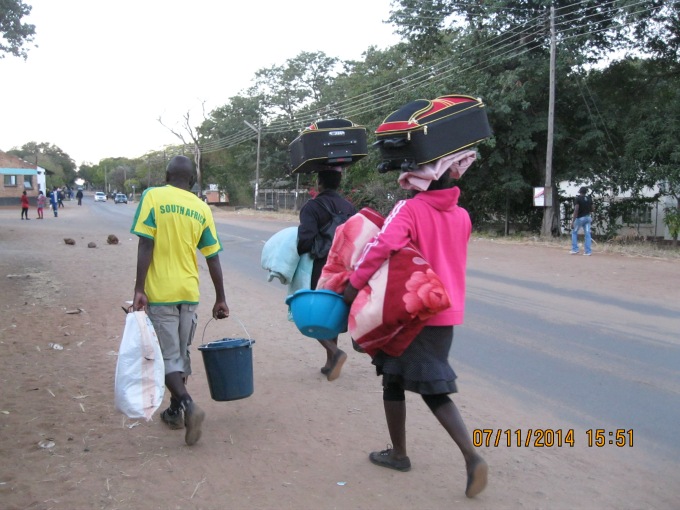
Reumbi asked my thoughts about Westerners donating free clothing, and vendors selling the jeans for $1.00. My only comment was that someone had to pay for the shipping. I thought $1 was a good price for jeans. Since it was July (winter on this side of the equator), it got dark at 6:00-6:30 p.m. We walked through the market looking at the many different items for sale, so different from the items I saw in other countries.

At a local market. People stared at us because white people did not come to this area. People would purchase food for the next day. They did not have enough money to purchase food for more than a day in advance.

Plants for sale at the local market. (Finally, a use for all the plastic bottles).

The local market where the blacks shop. There was no electricity.

The local market where the blacks shop. There was no electricity.

The local market. These are tubs used for bathing.
It was nearly dark when we arrived at the cinderblock home. As we approached the entrance, Reumbi called out to her family announcing she brought four guests with her, and to hide the dog. What a delightful translation of “put the dog away” so we could enter. Most families have a dog to protect their property from thieves and/or animals like elephants. We carefully climbed down a steep dirt ditch, balancing on stones, and walked over a narrow cement bridge, then up the other side stepping on chunks of concrete to arrive at the doorway.
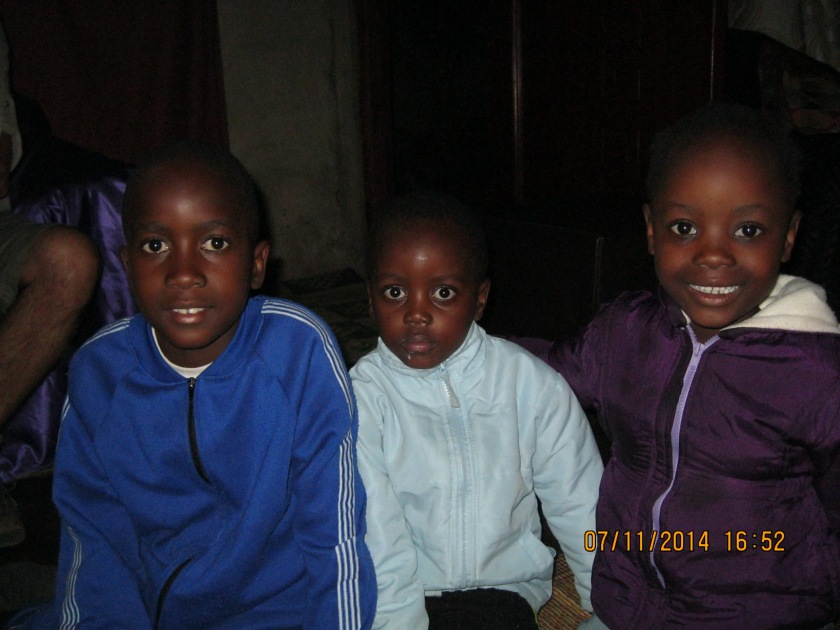
The youngest children had never seen a white person before.
We took off our shoes when we entered a large living area with 2 couches and a couple of chairs. The children stared at us, no one was expecting company, and the two youngest had never before seen a white person. Reumbi informed everyone that we were tourists she met and were interested in what life was like for them on a daily basis. She had invited us over to meet the family and to watch them eat.
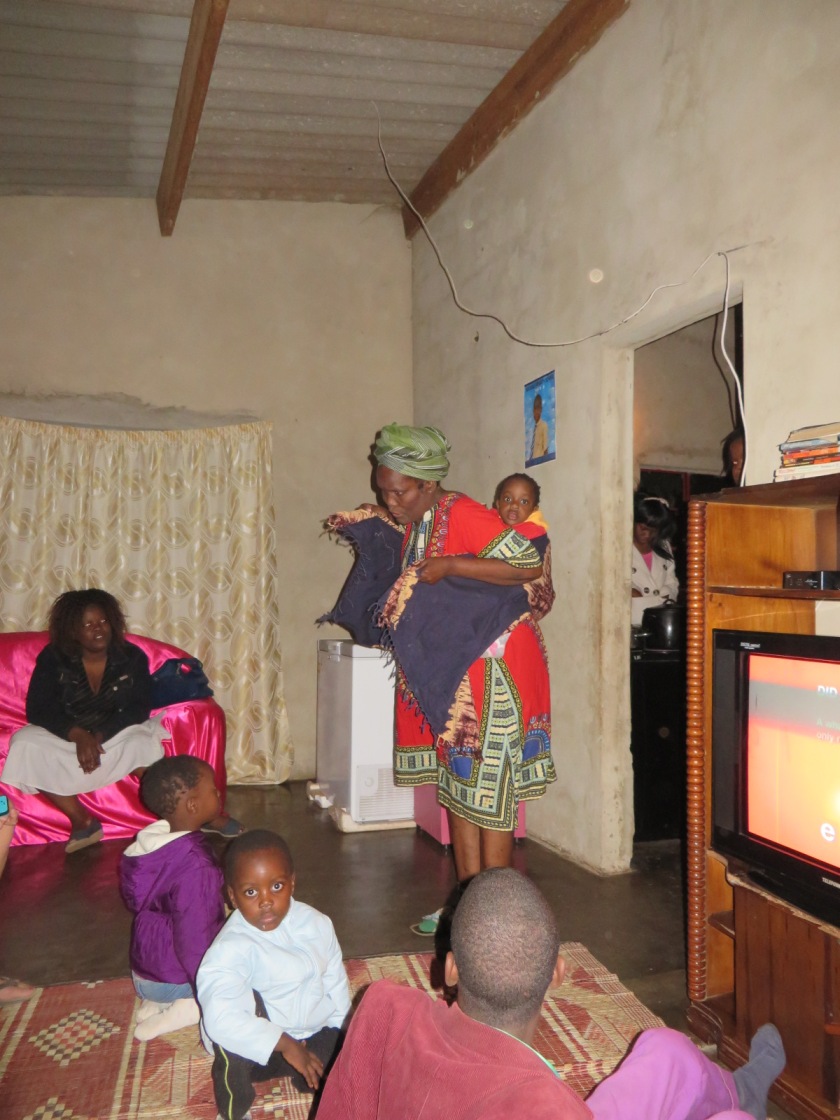
Reumbi’s mother was thrilled and welcomed us. Reumbi lived with her mom, three sisters, her two children and several nieces and nephews in the 2 bedroom house. Everyone shared beds except for the matriarch. Reumbi, her 11 year old son, and 2 year old daughter shared a twin bed. There were no indoor toilet facilities but they did have a flat screen TV. Each room had one dim light bulb dangling from wires attached to the ceiling, and the floor was concrete. 2 adult sisters, ages 17 and 22 slept head to toe in another twin bed. I asked if she was irritated at her sister, would she put her toes in her sister’s face, and she said, “yes, sometimes”.
Some things are the same all over the world!
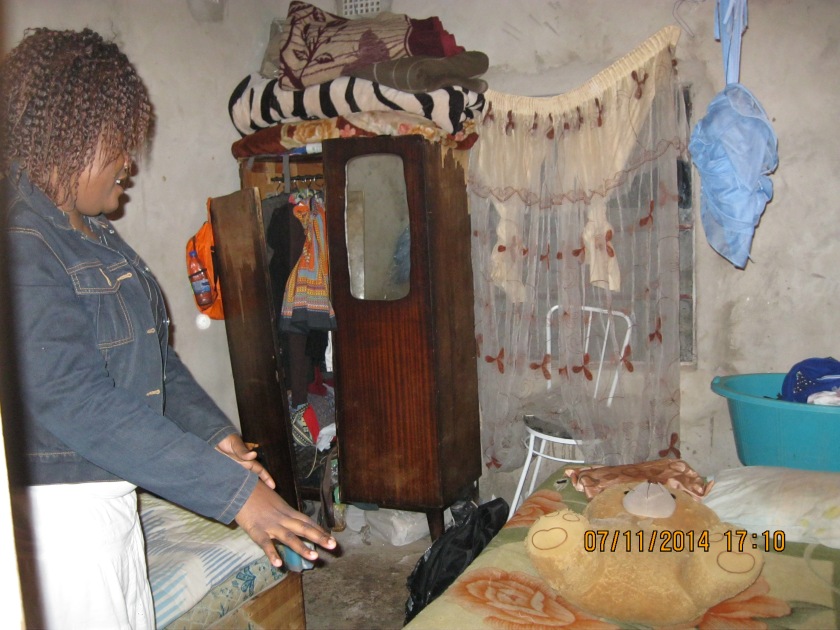
Typical bedroom, 4 people slept here, the grandmother on the left bed, and Reumbi and her son and daughter on the twin bed on the right. These are all of the family’s possessions.
When I commented about how well behaved the children were, Reumbi talked about our visit being a novelty and the children were using their best manners. They were not normally so quiet and often were rambunctious. This was a unique event and they were absorbing everything. Meanwhile, the children shyly watched us.
One of the sisters cooked dinner on a narrow 4 burner stove. Each family member went into the kitchen and served themselves a plate of food from the pots on the stove, then took their plate back into the common living room. The adults sat on the 2 sofas in the room, and the kids sat on the floor. The focus of dinner was to eat, not converse. Eating consisted of taking a pinch of pap (like mashed potatoes) between their fingers and mopping up the stew-like meal of traditional meat and vegetables. Pap is maize (like fine cornmeal). They ate in silence while we westerners watched.
After the adults ate, the youngest sister, about 17 years old, approached each person sitting on the couch. She carried a bowl of water and a small dishtowel. Each person dipped their soiled fingers into the water and swished them around, washing their fingers, then wiping their hands on the towel that the sister carried. This was like a chore we would have in the USA. In Zimbabwe, one person is responsible for carrying the bowl of water and towel for washing after dinner.
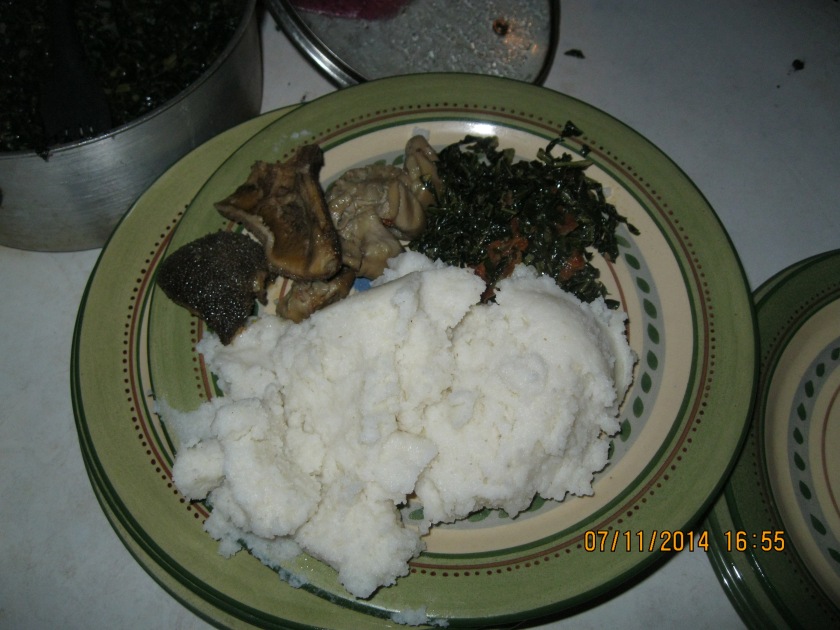
A Typical meal, “Pac” is the staple (made from maize). No utensils are used to eat the food.
Reumbi’s mother demonstrated how African mothers tie their baby to their backs with a blanket or towel. We were later taught that an easy way to identify a black rhino vs. a white rhino is to remember that black people carry their child on their back, and black baby rhinos follow behind their mothers. White people / Westerners push their babies in a stroller in front of the mother. White rhinos walk in front of their mothers.
Each of us thought we should bring some sort of small gift, I took my paints and paintbrushes and two apples. I was afraid the apples were not enough of a “gift” but the family was grateful, and the grandmother cut them into slices, giving the pieces to the children. It was a treat. Near the end of the visit, we offered our “gifts”. The 13 yr son was incredulous that I was giving him paints and paintbrushes and Reumbi said that he would share them with his classmates. I quietly told her that the paints were for the family, not necessarily for his classmates. She reminded me it is always better to share. If he were to keep them for himself, the classmates would steal them. Better to share. The person who shares feels good, and the people who are receiving feel good. It was a reminder that has stuck with me- it really is better to share. Later, I realized I had not seen any cupboards or storage areas. They had very little in the way of “stuff”. They probably had no paper.
My Australian friend says:
“when you first asked us to join you on this ‘adventure’ I felt the need to take some form of gift with us. But with little time and little knowledge of who and what we were visiting, I improvised by gathering some things from around our room. I collected together some pieces of fruit, some tea, coffee and sugar sachets from the tray in Mike’s room, an old T-shirt that Nikkiema threw out, and some fashion magazines left behind by Lindsay – basically things that “westerners” would usually discard.
We gave the fruit and tea & coffee sachets to the folks at the Old People’s Home. I think I had some Aussie balloons that I gave to the Pastor’s children [remember, we stopped at Rumi’s Pastor’s house, and they were in the middle of their dinner, but still welcomed us into their home]
Rumi’s two younger sisters almost fought over the old T-shirt, it was decorated with some sequins. And they were delighted with the second-hand magazines. Part of me felt that the gifts I was handing them were so insignificant, and yet they seemed truly happy and grateful to receive them. Again, what does that say about us – that they are happy to receive things that we would consider garbage.
At 7:30 p.m., the taxi that had originally dropped us off at the home, came back to pick us up. We then headed off to our next adventure- which was actually eating dinner with another local we met; Clive, a white Rhodesian who owns a farm that is “currently occupied by the military.”
But that my friends, is an adventure that is still to be written.
*Special thanks to Julie and Laura for your memories and help with this essay. This was an experience that changed my life.
